#And its not lost on me that both actors were criticized for their acting
Explore tagged Tumblr posts
Text
Just watched Attack of the Clones and noticed more parallels between Anakin Skywalker and Osha Aniseya.
(Long post ahead, with visuals!)
In AotC, Anakin's mother dies before she can tell him, "I love you," and Anakin descends down a path of destruction out of grief.
Osha force-chokes her father figure before he can say, "I love you," because she grieves his betrayal and the loss of her family.
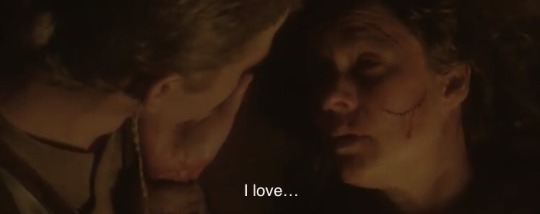
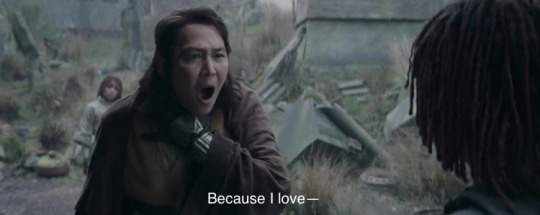
Now these are very different forms of paternal love by Shmi and Sol, but I LOVE comparing and contrasting Anakin and Osha because these situations lead to different outcomes and reactions. Yet at the core, they have these strong emotions they hold inside. In the simplest form, they have both lost parents and both lost their mothers.
Both Osha and Anakin are born with the help of the Force, we know this. Anakin is born completely of the Force. Osha and Mae are born through their mother's magic augmented by the Force. Anakin didn't care for his home planet. He was born into slavery and trauma. But his mother loved him dearly. He left because he dreamt of better. To be a Jedi and return to free her too.
Osha came from a family that loved and protected her, but she longed for individuality and to explore the galaxy outside of their coven walls. Anakin finds his mother in her last moments, and the dark side takes over him. He seeks revenge and kills the Tusken camp out of rage.
Osha learns the man who raised her killed her mother. Her silent anger is simmering. She doesn't lash out the exact same way, she's in shock.



Their reactions work for both of them. Anakin had his emotions building inside of him. In his feelings of inadequacy, he tells Padme that he is used to fixing everything, but this is the one time he failed. Anakin thinks he lost his mother due to his own weakness and believes more power will prevent it in the future. However, he is also ashamed of how his anger manifests and the act he committed in the camp. Padme tells him, "To be angry is to be human." (And as I am typing this RotS is on and Palpatine tells him the same, that seeking revenge on Dooku is natural despite his unease). But because of his training, Anakin says, "I'm a Jedi. I know, I'm better than this."

Osha has power, but she doesn't realize it. Striking out at Qimir catches her off guard. Killing her master startles her to shock. She's not seeking power. Osha seeks an understanding of herself and to be understood. Just like Anakin, Osha believes she failed as a Jedi for showing her anger. For not being able to accept loss. Qimir pushes her to confront his realization, and similar to Padme, he tells her, "This anger, this pain. This is who you are."

Anakin and Osha descend to darkness in similar ways. They feel and emote in similar ways. The Jedi are not successful in teaching them how to healthily deal with their feelings. So these experiences mirror, but they are still distinct examples of Jedi that are seduced to the dark side.
To me, Anakin Skywalker and Osha Aniseya are incredibly compelling characters that are only strengthened when analyzed together. End.
#cross posted from my twitter#thanks for reading#And its not lost on me that both actors were criticized for their acting#I can only hope people will come to appreciate Amandla's performance the way they appreciate Hayden's now.#the acolyte#osha aniseya#anakin skywalker#death mention tw#star wars#oshamir#anidala#padme amidala#verosha aniseya#qimir#qimir the stranger#the stranger#long post#meta i guess?#renew the acolyte#attack of the clones#revenge of the sith#aotc#rots
85 notes
·
View notes
Note
heyyyyy! i see a lot of criticism on wottg lately and i think they are sooo right. what's your opinion on wottg?
Hmm I already shared a bit of my thoughts about it but who am I to hurt you? Im just gonna rant again and more detailed I guess XD
First of all, I was soo confused by how rushed it was. You can even tell it by the title names. The book felt like it was written in one night. The mistakes also proves it. Editor was asleep? I dont know. Rick is just too old? I dont know. The worst of all, Rick doesnt care enough to put efford anymore? I still dont know, but it sure feels like it. Leo is treated like he is fine and daisy, Clovis being Morpheus's son, weird huge typo mistakes...
Not to mention characters were so ooc. And no Im not talking about: Annabeth threw a party, thats so ooc. I think she was so in character for that one. In fact, that part was my favourite in the book. It was good to remember her rebellious side after show messed her up with her goody two shoes personality. The real issue was Annabeth's and Percy's dynamics felt like they had 0 development in pjo. Wdym that girl is suprised when Percy comforts her? I just read SOM and I can pull so many scenes of Percy comforting her. Wdym Annabeth is fucking surprised when Percy acts all smart? How old they are? 12? (I suggest reading @lilislegacy s criticism for this parts, it was more detailed and so right!)
Its so obvious that Rick wrote this book when he was working on the show and wanted to merge them both together, which is soo wrong in my opinion. Look I like show actors, they are fine with the tv show. But they are NOT the book characters, they are actors. Walker is not Percy Jackson, he is the actor of him in the show. Leah is not Annabeth Chase, she is the actor of her in the show. Aryan is not Grover, he is actor of him in the show. I think Rick and some fans tbh, dont understand this fact. I love them and they deserve to be shine in the big screen, but books should stay books. When we open the book, we should see the book characters, not them. Book canon and show canon should never be together. Because no, they are not the same and would never be. Rick spent this whole book on advertasing his tv show and it was too cringe. Olympus+? Really Rick?
One of the weird thing was also adding Chiron's injury. I was confused bcs like I was sure Percy rode on him before and I know he would notice this. Its just makes 0 sense.
Were they good stuff? Yes, trio's scenes in general werr adorable. Seeing old campers again also. But I want to add that Rick lost a big chance to make this book shine. Where is Jason? Even mention of him would be a big hit, imagine him in that party. I know even with these mistakes, this book would be a hit. Also so many fans wanted this Idk why he didn't go for it.
I like Rick, even though he makes me so angry with this kind of stuff. He gave me a perfect childhood with this characters. But that doesnt mean I have to agree with his every decision and support him no matter what. Idk if he is getting old or anything but this book was just a fanfiction. And not a good fanfiction because I know I see so many better written fanfictions. I hope he fixes his mistakes in the next book because I am still hopeful, even though I am a bit scared. I still want the next book soo bad. Wishing it would be more like Chalice you know :)
Oh and before I finish it, I am forever mad for him mixing Annabeth's lemon shampoo!!! I'm sorry but that was special to me. Apple shampoo? Wdym usual apple shampoo? Someone need to fix this typo mistakes!
Thank you for your ask anon :)
#I love ranting#this book was another boo#sorry not sorry#Same rushed problem#annabeth chase#percy jackson#grover underwood#pjo#hoo#wottg#criticism#ask#rick riordan
12 notes
·
View notes
Text
I'm going to look at some RT critical reviews to see points raised and whether I agree or not.
'This feels like a show made by an algorithm catered to the kind of fans that hate filler and side stories in animation and hates when characters make jokes.'
yeah, hard to argue with that. the humor of the animated series felt missing.
'Netflix gets the look and action right in a lavish series based on the Nickelodeon show, but too-elemental dialogue and uneven performances '
definitely, the action and the visual effects, the vibrant and beautiful world were the highlights of the show. The dialogue is a disappointing downgrade from the animated series, and I lost count of how many times I paused the show and 100% nailed the next sentence a character was going to say. The writing is very simplistic and predictable. As for performances, it's really a mixed bag.
Aang's actor really looks the part almost perfectly, but I find his delivery at times very stilted and unnatural. I don't have any major issues with Katara's actress. Sokka just feels rather miscast to me. The actors for both Iroh and Zuko are both clearly excellent choices, perhaps the best among the main cast. I really wish we'd seen more Suki, she seemed well cast. Most of the minor characters worked well, I thought, Bumi, June, Jet. Azula's actress seems competent, but unfortunately she had very little to work with. If this was supposed to be Azula's origin story, someone needs a refresher of what is an origin story. Ty Lee and Mai... they just stood there for the most part, so can't say much about them, sadly.
Obviously, the elephant in the room is Zhao. Terrible changes to his character and terrible casting choice, that was just a big disappointment.
'This version is weighed down by stiff acting, slow pacing, robotic dialogue, touch-and-go CGI, and more exposition than an army of earthbenders can handle.'
I'll agree on the uneven acting, but to call this pacing SLOW is... I don't know, someone needs to take away this critic's crack pipe. I thought the CGI was serviceable. Dialogue and overreliance on exposition, yeah, those were issues for me.
'While the grand scale and beautiful colors help this project as well as the bending and fighting, It seems to lack the heart and overall tone that made the animated series so special.'
and
'Avatar: The Last Airbender has small moments worth appreciating…But narratives are built on intimacy and characters, not just wide shots of beautiful landscapes and creature designs. '
These two reviews seem like a really good summary of how I felt about this show.
'In its haste to include all the greatest hits from Book One, the Netflix series woefully neglects the cartoon’s greatest strength: its characters.'
Umm, yeah... more than one character kind of gets done dirty by this condensing of total runtime.
Finally, I couldn't find the original review to quote, but earlier I read one critic saying how this show was somehow 'grittier than the original, yet somehow also less mature'. That also felt like perfect summary to me.
11 notes
·
View notes
Text
When Pam Grier Met Vanessa del Rio

by Chris Xtravaganza
The NAACP Image Awards, a beacon of recognition for Black excellence, was the backdrop for a meeting that would be etched in history. The air was thick with anticipation as two giants of their crafts prepared to receive honors that celebrated not just their work but the indelible marks they had left on the world.
Pam Grier, a cinematic force, had risen to fame with her iconic roles that shattered stereotypes and reshaped the narrative around Black women in film. Her portrayals were not just performances; they were statements of power, sensuality, and resilience. She had become a symbol of empowerment, inspiring generations of actors and filmmakers to embrace diversity and challenge the status quo.
Across the room, Vanessa del Rio, a luminary of the adult film industry, was being acknowledged for her groundbreaking career. Her performances transcended mere entertainment; they were acts of defiance against the rigid sexual norms of her time. Vanessa had championed sexual freedom and body positivity, becoming an icon for those who sought to reclaim their sexual agency.
As the awards were presented, the gravity of the moment was not lost on the audience. Here were two beautiful Black women, each having overcome barriers and pushed boundaries in their respective fields. Their presence at the awards was a testament to their enduring legacies and the doors they had opened for others.
Their encounter backstage was nothing short of monumental. It was a convergence of two powerful forces, a moment that symbolized the intersection of film, sexuality, and the Black experience. The air between them was electric, charged with the knowledge that they were part of a historic occasion.
"Pam, meeting you like this… it's more than an honor," Vanessa expressed, her voice tinged with the weight of the moment. "We've both fought to be seen, to express ourselves without apology. Our art has touched lives, broken chains, and ignited change."
Pam, with a knowing smile, replied, "Vanessa, your words resonate deeply within me. Our paths may have been different, but our impacts have rippled across the globe. We've shown the world that Black beauty and sexuality are multifaceted and worthy of celebration."
Their dialogue flowed seamlessly, a dance of mutual admiration and shared understanding. They spoke of the struggles they had faced, the criticisms they had endured, and the victories they had claimed. They were warriors, artists, and revolutionaries, each having left an indelible imprint on the cultural landscape.
As the cameras flashed, capturing the essence of their meeting, the significance of the moment was palpable. This was more than a chance encounter; it was a celebration of Black womanhood in all its forms—strong, sensual, and spectacular.
Their legacy was one of boldness and bravery, a dual narrative that had played out on different stages but told a similar story of triumph. Pam Grier and Vanessa del Rio, through their art, had not only entertained but had sparked conversations, challenged perceptions, and inspired movements.
As they bid each other farewell, with promises to continue their dialogue, they knew that their meeting would be remembered. It was a moment when history paused to acknowledge the transformative power of their work and the enduring impact of their fearless expression of self.
The NAACP Image Awards had witnessed the coming together of two legends, and the world was all the richer for it.
2 notes
·
View notes
Text
okay putting my real and comprehensive opinion on bvddie here even though no asked just because i feel like i dont make it very clear
i ship bvddie but i do not think its happening, i lost hope for it around season 5 when i dropped the show because i felt like we were constantly being baited and tbh i couldn't stand what the fandom was. thats mostly why i dont post bvddie a lot because ultimately i don't want to interact with the loudest portion of that fandom. after buck came out as bisexual, i stopped caring about it even more even though i still enjoy the idea of it because instead of just thinking about buck being queer, he actually was. first and foremost, i like canon queer representation so bucktommy obviously takes precedent because eddie isn't canonically queer (yet, idk, maybe tim minear will pull a fast one on us). i care way more about hen and karen than i do about taylor/lucy, even though i like both ships. i'm okay with criticism of it, especially of the fandom because to be honest, i do think it's fair to call bvddie theories ridiculous and out there because they kind of are, BUT i don't think it hurts anyone to think that or hold out hope, and it's nice to see speculation and theories bc thats what fandom is all about. that couch theory still has a hold on me even though i dont think it's intentional lol. i don't think it's okay to directly make fun of any bvddie for having crazy theories because we've all had ships that make us crazy and thats okay. the exception here is if that particular bvddie is making fun of bvcktommys for their theories n stuff because at that point its hypocrisy. this goes both ways. if you're gonna come up with a crazy theory, you can't look at other people's crazy theories and claim any high ground there, which is unfortunately something i see a lot in both fandoms.
although one thing i will not do is say "well both sides are equally bad" because objectively bvddies have been around a lot longer and done much worse things. that doesn't mean bts are all innocent either however, one ship clearly has dominance over this fandom and has a large, extensive track record of harassing actresses/generally being aggressive about their ship before bt ever even happened. so there are many, many more cases of those shippers feeling threatened and lashing out unfairly while the others are often just acting out of defense. if there's a bully on the playground picking on someone else, and that person kicks them in the shin, i'm obviously going to hold the bully much more accountable for their behavior than i am for the kid defending themself. while that's obviously not always the case, (i've blocked my fair share of bvcktommy girlies for being weird about female love interests) when it comes to the "both sides" argument, we literally just know that's not true. also most of the shit said about tommy by antis is deeply homophobic so jot that down.
tbh i think being anti bt is much more egregious than being anti bvddie because that's actual queer rep that you're bashing and hoping dies. but there's a difference between being "anti" anything and just not liking it and thinking its annoying.
at first i think i understood it because i think bvddie kind of was the underdog when it first started bc it's was non canon queer ship between two canonically straight characters but thats obviously not true anymore and hasn't been for a while. bvddie has the attention of the actors, has the positive acknowledgement of journalists that get to directly interview those actors, and has the popularity within the fandom. so it's kind of just punching down at other ships at this point, especially ones including female characters who already don't get a lot of development.
that being said, again, I STILL LIKE BVDDIE, and have plenty of bvddie mutuals that i love so i try to avoid the generalization of "ALL bvddie shippers are like this 🙄" because obviously thats not true and there's nothing wrong with shipping bvddie obviously lol it's just a ship and a cute one at that. i think its ridiculous to care that much about hating a ship you just don't like that much, which is fine but like i think many ppl in this fandom need to take several steps back and realize it's not that fucking deep, just like the things you like and leave everyone else alone.
tldr: i like bvddie but im not gonna avoid criticizing a big part of that fandom. ultimately i think ship wars are silly and i don't really understand them. i like queer representation and i like queer headcanons but im not gonna hold out hope for anything. im very ship and let ship until you start to be a dick about other people shipping and then i think you deserve to be called out, especially if you're actively being homophobic/misogynistic/racist. also i think bvddietommy should be endgame lol, let chris has THREE dads and then everyone's happy :D
edit: oh and obviously i like bvcktommy if that wasn't abundantly clear lol
#i think thats it i just wanna clear about where i stand on everything even tho no one cares lol#but im adding this to my intro post sooooo itll be there#you dont have to click on this it's just reiterating shit ive said before but im putting it all in one place#i fear i dont make it clear bc sometimes i just be saying shit and it may come off aggro but these are my opinions
2 notes
·
View notes
Text
Year in Review: Books Pt 2
Rounding out the rest of my reading list. It's a short list, overall. One of my new years resolutions is definitely to carve more time out for reading, which may cut into my future bildeo bame time. Oh well! That's probably a good thing.
I'm Glad My Mom Died by Jennette McCurdy
I hesitate to criticize the content of an autobiography, especially one as open and honest as this one. I listened to this through the audio book narrated by McCurdy herself, and she gives a great performance through the line reading. Almost as if she was a classically trained actor! Still, I wonder if her reading may have compensated for the quality of some of the prose, and I might not have gotten through it if I were reading it myself.
The title sounds a bit callous to those who haven't experienced child abuse, like myself, but I understand it's a common enough sentiment from those who have, and you come to understand her perspective. It's not a statement made from a place of malice, but one of acceptance that her life has improved without her abuser present, no matter the complicated feelings. The book is also not wholly about her relationship with her mother, covering her experience with bulimia, anorexia, the toxic environments of Hollywood, though her mother is at the center of all of it. It's also not a complete bummer! McCurdy injects a lot of humor throughout the book and covers some of the fun moments she's had in her career. Which is expected in a memoir, I suppose.
Hitchhiker's Guide to the Galaxy by Douglas Adams
This book is as fantastic as it is ridiculous. The story opens on our protagonist, Arthur, protesting the bureaucratic destruction of his home for the construction of a highway through the area, before he is whisked away by a bisexual alien hitchhiker just in time for Earth itself to be demolished by bureaucratic aliens to build an intergalactic highway. Every plot development acts as both comedy and world building. They nearly survive execution by giving shitty criticism to alien poetry. The president of the universe got his position as a practical joke. A whale is created by a cosmic RNG manipulation machine, and has an inner monologue on the nature of its life just before it explodes and dies.
The outside universe is chaotic and incredulous, and the excitement of wanting to explore that universe through the lens of a hitchhiker almost overwrites Arthur's existential dread on the destruction of his home world. While the book can handle moments of genuine drama, it never goes long before that drama is overshadowed by a joke, or perhaps the drama is itself the joke. This might be annoying to some, but Adams' writing style is slow fluid you don't really have time to be annoyed. It's a short book, and I'm excited to read the next one in the series, if SOME people would return it to the LIBRARY ON TIME. They probably have by now.
The Storyteller by Dave Grohl
I only recently became a Foo Fighters fan, introduced to the album "In Your Honor" by a friend in early 2022, which I immediately listened to ad nauseum until my sister noticed and got me the CD for my car. Thank You Sister! I was sad to hear about the passing of Taylor Hawkins only a couple weeks after I learned who he was. I already knew Grohl had lost a lot of people in his life. But his book is not about grief, at least, not exclusively. Like the title suggests, this memoir is full of stories! And Dave Grohl is, indeed, a good Storyteller.
The book follows his life in a reasonably sequential order, though framed through the lens of a father looking back on his life as he raises his two daughters. It covers his musical influences, his time in Scream and Nirvana, the creation of Foo Fighters. If you like anything from that scene, this book is a good time. It does get a bit name-droppy towards the end. But like. This guy is friends with Paul McCartney! Composer and performer of the classic song "Temporary Secretary," and nothing else! Who wouldn't bring that up at every opportunity?
The book always flashes back to the "present," where his eldest, Violet Maye, is following in her father's footsteps as a musician, which I now realize I've never heard. Give a second.
...
She's alright! Sounds a bit like those "Foo Fighter" guys.
Beowulf translated by Maria Dahvana Headley
This is something I had previously read for college, but the translation we read was focused on accuracy for the original text, and I felt it was a bit buried under flowery language that would tickle under the balls of an academic, but hard to parse for a casual reader. That's not to say that Headley isn't an academic, but her translation focuses largely on readability in a modern context rather than textual accuracy, and for the first time I actually enjoyed Beowulf rather than just understood it.
For the uninformed, Beowulf is what 9th century monks used to read since they didn't have Dragon Ball. It follows the title character Beowulf as he heroically challenges three monsters (some bitch named Grendal, Grendal's hot mom, and a dragon) for the safety of the Geats and his own people, but moreso for the glory and spoils of the win, and the love of fighting. The story is always told in past tense, and Headley goes the extra mile of telling it from the perspective of a dudebro who relays the tale to his other bros. I truly think this is the version that would most resonate with my generation, but it probably won't get shown off in college classrooms for using phrases like "dude, they were fucked," and "#Blessed."
The Two Towers by Jolkien Rolkien Rolkien Tolkien
This is the second entry in my very slow read-through of Lord of the Rings. I have been called a fake nerd for not having read these books. And they were right for calling me that! I only have the distinguished and highly regarded appearance of a nerd, and that needs to be corrected! One book a year, apparently. I read Fellowship last year, and while I enjoyed the second half of that book a great deal, damn can Jolkien describe a hill. A significant portion of book one was dedicated to the hobbits journey to Rivendale and singing songs of old Middle Earth legends, which are probably more enjoyable on re-reads. Book two has much better pacing, imo.
Immediately, you are set into the action of a fractured narrative. Pipin and Merry are missing, Frodo and Sam left the fellowship to go on their own fruity adventure, Boromir is dead, and Aragorn, Gimli, and Orlando Bloom are left to figure out what exactly the fuck happened to everyone. I like how each storyline is told. From what I remember in the movies, everything is interspersed with each other, but in the book you have to follow everyone separately, creating a genuine sense of mystery that slowly unravels itself. Frodo isn't even in the book until halfway through!
Each storyline also introduces a new, fun element of Middle Earth that makes the world feel much more developed than in Fellowship or even the Hobbit. I fucking love Ents. And big spider... Frodo's relationship with Gollum is also fascinating; his desire to save this gross little freak working as a reflection of his feelings about himself. Will someone try to help me if I end up like that? Will my friends still love me? It's a very real possibility as he carries this curse, and by proxy makes me love Samwise that much more, since we know from his narrative perspective that yes, he will love and try to help Frodo no matter the circumstance. Even if the current little freak is getting on his last nerve.
The Shining by Stephen King
I've not read a ton of what I'd classify as "horror," outside of short form fiction, but apparently I love to write about it, so I wanted to take a look at the predominant Horror Guy from the 80s times. I love the movie that spawned from this, and knew that Stephen King hated it for some reason, and now I think I know why! The movie is definitely its own beast, and I think I may write a separate blurb for it if I ever rewatch it in the near future, so I'll refrain from too many comparisons.
The story follows a boy with psychic powers, and a haunted house that eats boys with psychic powers. The Torrances are a very loving family, or they would like to be, but their dynamic is plagued with generational trauma and the father's, Jack's, alcoholism. They are put in charge of the Overlook Hotel, which has to be maintained over the winter lest it be torn to pieces in the Colorado mountains. Why don't the owners hire more than one family to take care of this big ass hotel? They're a bunch of cheapskates!
I would love to make an entire deconstruction on Jack Torrance. He's a man who's been unbelievably shitty to his family and the people around him, saw the monstrousness in himself and desperately tried to back peddle. It is the Overlook, this entity that breaths within the hotel, that uses that darkness to carve him out from the inside and use him as a puppet to threaten his loved ones. It actually fails at first, Jack's love of his wife and son beating back the ugly thoughts the hotel plagues his mind with, and thus it had to get him drunk to make any real headway, force him to relapse into the man he wanted to overcome.
The mystery of the Overlook's origin is compelling. It clearly lures people with "the Shining" into itself to devour and maintain itself, but where does it's monstrosity come from? Was it always there? Or was it the violence and racism of its previous owners that left such a strong imprint that created such an entity? King's answer would probably be a mix of both, but that last interpretation makes the ending much more poignant to me. A monster that victimizes people who shine created by monsters who victimized women and people of color, ultimately overcome and destroyed by a black man with psychic powers, a housewife, and a little kid. Maybe that's too generous an interpretation for a book written by a white dude in the 70s, but I don't give a shit. Night of the living dead author and all that.
And that ends my reading list! I don't really expect too many to read any of this, let alone all of it, but if you did, thank you! This is not only to share what I've read this year, but also to go back and appreciate what it was I read, so it doesn't become a vague tear in the tapestry of memory. Wow that sounded pretentious as hell! I hope I made these books sound at least a bit interesting for you, because they're all genuinely good reads! And if you have a book you think I might like, please let me know! I'm always looking for new books to get halfway through and never finish.
#book reviews#reviews#i'm glad my mom died#jennette mccurdy#the hitchhiker's guide to the galaxy#douglas adams#bookblr#the storyteller#dave grohl#foo fighters#violet maye grohl#beowulf#maria dahvana headley#the two towers#jrr tolkien#lotr#lord of the rings#the shining#stephen king#books#my post
4 notes
·
View notes
Text
Raging Bull (US)
Trapped in a hospital bed, Martin Scorsese was at death’s door. After years of pushing his body through intense working hours, prescription drug abuse, and sacrilegious amounts of cocaine, the then-35-year-old suffered internal bleeding, boarding brain hemorrhaging. Years prior, Robert De Niro was handed Raging Bull, the memoir of one-time middleweight champion boxer Jake LaMotta. Notorious for letting opponents pulverize his body into a numb chunk of meat to the point of exhaustion, LaMotta drank heavily, beat his wives, and racked up a charge for allowing the prostitution of a 14-year-old girl at his club. By the release of his book, he was an out-of-shape entertainer with brain damage working rundown night clubs to feed himself, reciting Shakespeare and cracking Don Rickles-esque crowd work. Seeing Jake’s potential as a character, De Niro pitched the story to Marty.
Occupied by his promising follow-up to TAXI DRIVER (1976), Scorsese was deep into production planning for a nostalgic musical revue, NEW YORK, NEW YORK (1977), convinced he'd secure his spot as one of the great American directors. Navigating a turbulent marriage and an affair with his lead actor, Liza Minelli, there was no time for others’ passion projects; besides, he had no interest in a sports movie, with little exposure to boxing growing up. DeNiro would persist over the next few years. When the musical was a critical and financial disaster, Scorsese could not believe it, having given his all. Pushing closer to the edge, Marty had a revolving door of girlfriends and drug habits. In 1978, he was taken to the emergency room for coughing up blood and collapsed at 109 pounds. Watching the tubes keeping him alive coming in and out of his body, he saw how far he’d fallen from the son of two garment workers in Little Italy, a boy who had fallen under the influence of a charismatic priest and at one point considered becoming a seminarian. He recounts, “I prayed. But if I prayed, it was just to get through those 10 days and nights. I felt [if I was saved] it was for some reason. And even if it wasn’t for a reason, I had to make good use of it.’” He realized his self-destructive tendencies could bring anguish to anyone in his orbit, including those he loved, just like LaMotta. Finally, the director was ready. De Niro and Scorsese began putting a draft together from LaMotta’s text, then they brought Paul Schrader to work on a draft. After Schrader handed in his work in under six weeks, Scorsese and DeNiro put their finishing touches on Schrader’s structure, adding their favorite scenes from the memoir. The studio’s first reaction was, “Why would you want to tell a story about a human cockroach?”
The preproduction research for both director and actor serves as a template for contemporary filmmakers and actors. De Niro’s preparation for the role inspired an entire generation of actors looking to commit their entire body, a standard that has become its own acting school. Scorsese and designers attended boxing matches, studied boxing photography books for composition, consulted LaMotta and his former trainers for accuracy, and home movies for the family’s interpersonal relationships. Having lost a fight, De Niro’s Jake mutters, “I’ve done a lot of bad things, Joey. Maybe it’s coming back to me.” After dancing with death, Scorsese worked on RAGING BULL as if it were the last film he’d ever make. Borrowing from the great masters, he weaves the most graceful brutality of the latter 20th century put to celluloid. Hitchcock’s PSYCHO (1960) shower sequence served as template for Jake’s annihilation on the robes, followed by a shot of Ray’s glove taken from Samuel Fuller’s THE STEEL HELMET (1951). One of the first boxing films of the sound era to place the camera inside the ring, director of photography Michael Chapman (TAXI DRIVER, THE LAST WALTZ and AMERICAN BOY) and Scorsese play with frame rates within takes, flying the camera through the action, and relishing in all they have at their disposal. To add an extra layer to the period piece, the production chose black and white film stock. The great Thelma Schoonmaker cut the film; this was her first feature as editor. Together with the director, she elevated the work to a vicious level of grit violence. Famously, when asked how such a nice lady could edit such violent films (for Scorsese), she replied, “Ah, but they aren’t violent until I’ve edited them.” In all its barbarity and beauty, the film gives a naked depiction of humanity. It delivers a vision as complex as its subject. To call RAGING BULL one of the greatest movies of the 1980s is a misnomer. The level of experimentation and personal filmmaking could only fit in the realm of 1970s New Hollywood. Along with THE KING OF COMEDY (1982), LaMotta’s story received a greenlight during a golden age of American cinema, only to release during the postmortem of United Artists and the cinematic wasteland of studios. Artists’ work is often cited as therapeutic. RAGING BULL offers a new light, proving that it can also be the first step towards repentance of sins. As the film is viewed for a 4K restoration, we should keep in mind how much the director has accomplished over the years. In the decades since the film’s release, Scorsese has continued to uplift new voices in cinema through the World Cinema Project and educate through the Film Foundation. The now-80-year-old director has made it clear his penance for his early years is permanent. (1980, 129 min, DCP Digital)
Ray Ebarb
0 notes
Text
Film Form- The Shoot
We shot over the course of 2 days and the shoot had its fair share of problems, some by happenstance, others as a result of our mistakes. A lot of these mistakes snowballed from previous issues we had in preproduction that I have already discussed so I'll separate what happened into different sections.
Our first problem was the shot list. As soon as we got to the space and started setting up the camera, both me and cinematographer realized a lot of our early establishing shots would not work with the layout of the room and the production design. This meant we had to improvise and use the shot list as a guideline to what shot we needed to move onto next. This tested my ability to make quick decisions, but because I was so involved in this, I believe this created confusion for the actors and some of the crew as if we didn't know what we were going to do next, neither did they. I tried my best to keep communication running, but the atmosphere on set off the bat was low energy and general stress and confusion, which is not a great way to start the day. Again, this is a problem that started in preproduction. If we had had more time with this location, we would've been more prepared, so the decision to stick with this location and ignore the rest should've been made quicker.
Second problem was sound recording and lack of crew. We didn't manage to get any extra crew for our shoot and that proved to be vital. When sound recording we faced the issue of hearing sounds outside, but because we were already spreading ourselves too thin we didn't have anyone who could stand outside and make sure that the noise levels would be down. This meant that we were stopping regularly due to noises and this was affecting the morale of crew and actors. I tried to accommodate our sound recordist asking what she needed in each take, which helped establish communication between us, however in the regard of keeping momentum of the shoot going it was really slowing us down. Regarding not having enough crew, this also meant that we were all doing multiple roles. I was acting as both the director and the AD, which made lines of communication difficult for me as I had to take a lot of the problems from different departments and try to appear calm and decide on what to do.
Third problem was safety concerns. A storeroom staff entered our set multiple times expressing safety concerns about our equipment. We were appreciative that he took the time to explain what was wrong and we tried our best to fix it. However, this meant we had to stop and start multiple times throughout the two days due to these reasons. It would reset the momentum we had created filming and it would stress out the crew to have to deal with it. I recognized this on set, but I frankly didn't know what to do about it other than try to fix the issues and to keep going.
Almost done with the problems, I promise. The last problem was the actors. I felt that when we got on set the work I had put in getting to know them and establishing a relationship, unfortunately didn't pay off. My confusion with the other problems we were facing, as well as the stress I was under translated into non effective communication with them. I attempted to explain and apologize for all the stopping and starting for either sound or safety issues, but I could see that they were not feeling good about it and at the time I wasn't able to handle that. I continued communicating the issues we were facing the best I could, but by the end they sent an email complaint about how they felt on set. We also lost our producer on the 2nd day which made communication between me and them even harder. Some of the criticism was justified, but I also believe that I was under a lot of stress on set, something which they could clearly notice, and under the circumstances that we were under I did the best I could at the time of the shoot. With the benefit of hindsight there is handful of things I would've done differently starting in preproduction and the production itself, but I believe I handled a stressful situation with the abilities I had at the time. I will learn from this experience and make sure the mistakes I made were worthwhile as I will learn from them and not let this happen again.
0 notes
Text
On Eastern dramas vs Western dramas
Part 2: On Theatricality and how it transfers into Chinese/Eastern Dramas and Cinema
Part 1 Part 2
Here, I reference a fantastic article from the Asian Theatre Journal, 2008.
So to recap, the problem I’m exploring is this: Why do some East Asian dramas/movies look so over the top? Overacted? Overemotional? Why is it not more realistic?
My answer is in part 1, on the concept of mo, which is the traditional Chinese thought that emotional revelation is more important than accurate realistic depictions in art. Western audiences are more used to plot-heavy, realistic depictions of dramas, whereas traditional Chinese audiences are used to the opposite. They find the plot not so important, but focus more on the content of the work, the spirit of it, how it makes you feel.
1. How traditional Chinese drama translate into cinema/screens?
Making the jump from Beijing/Peking opera stages, or jingju, to cinema screens caused a lot of trouble.
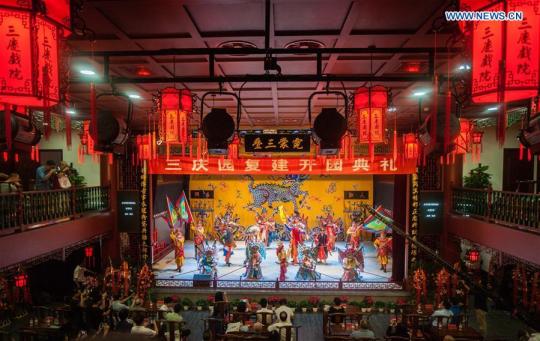
a. Production-wise, early 1900s
It was difficult to adapt the very open, 3d stage into a “realist flat screen,” which was much more advantageous to Western eyes because the camera lens was invented based on “Renaissance principles of fixed point perspectives and foreshortening.”
b. 1950s-60s
Many still tried to adopt the Beijing opera style into film, but it was still very hard because the two mediums were so contradictory. Beijing opera relied on live, grand aesthetics along with the knowledge that the important aspect of drama was emotion and internal struggle, vs film at the time was very focused on accurate “mimesis,” or imitations of real life. One such example was critics actually laughing about the adaptations because the opera actors mimicked riding a horse in the traditional style - that is, minus the horse. Film would have them ride a prop or real horses.
Eventually, many changes were made to the style to better incorporate it into film, and it still kept a lot of its original roots (i.e. makeup/grandiosity in costume, emotions, etc). Western concepts of a limited stage, and emphasis on plot and tragedy were expounded upon. And eventually you have the modern-day dramas (1970s+).
2. Japanese Noh 能 theater - Kurosawa’s Ran
Noh is a Japanese form of theater that is a dance-based dramatic work. It tells stories of supernatural beings transformed into humans and etc. One of its major notes is its very stylized conventional use of specific gestures to portray emotions. Iconic, specific masks are used to portray the roles of the actors such as the ghosts, women, deities, and demons.
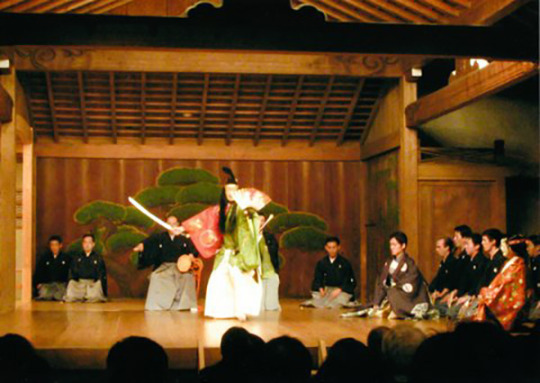
Akira Kurosawa’s Ran is lauded as one of the greatest films ever made. It’s a Japanese-French production heavily inspired by Shakespeare’s King Lear. There are many many detailed videos on YouTube about his precise filming methods and movement aesthetics. The body language can be seen as “over-acted” if you come from a Western background. Why? Because it takes from traditional Noh theatre:
Long periods of static motion and silence, followed by an abrupt, sometimes violent change in stance. Heavy ghost-like Makeup. Highly emotive gestures, sometimes repetitive to emphasize the characteristic of a character. All very unrealistic, but that’s not the point, right? Because this also displays mo, it takes the emotive expression, the revelation of fear/action/hope to the front of the stage.
3. Japanese Kabuki theatre - acting style is also larger than life
Kabuki actors also make great effort to express themselves in highly stylzed gestures (i.e. the men play women’s roles and over-act their femininity).
One major difference between Kabuki and much of Western theatre is that kabuki actors make less of an attempt to hide the “performance” aspect of the work. They’re fully aware that they’re performing, and the audience isn’t there to get “lost in the moment.” Everything -- actors, costumes, dialogue, is larger than life. Realism is far less emphasized, the form generally favoring what is often referred to as “formalized beauty.”
One example of this is the highlight of an aragato kabuki performance: the famous mie. The mie is a dramatic pose adopted by the main (oftentimes male) character during moments of emotional intensity. (The proper phrase for this action is mie o kiru, or to "cut a mie.") Announced by the beating of wooden clappers, the actor freezes in a statuesque pose and crosses one or both eyes. Often it's preceded by a head roll. The idea is to capture the highest moments of tension into one physical gesture and to more or less hold the actor and the audience in a breathless trance. After a few seconds, the actor relaxes and the play continues. A mie can be cut in various specified positions, depending on the character and the moment. When exiting, an aragoto character may perform a roppo exit, which combines several of these poses in rapid succession, before leaving the stage.

The mie pose
This is not to say that modern Japanese dramas and works directly descend from Kabuki or Noh or other theatrical traditions. But like the Chinese beijing opera, the concept of aesthetic beauty/mo, emotional revelation, these ideas all combined with Western influence and modern Western perceptions of good story-telling/acting to make up the modern Eastern dramas of today.
4. How do all of these things combine into the supposed “cheesy/corny/over-acting” of modern Eastern dramatic works?
All of these cultural roots combined with Western depictions of a modern story (i.e. Shakespearean tragedy in five parts: Exposition, Rising action, climax, falling action, and denouement, ofc there are other ones but this is the one I learned in school), I believe make up what we see today in modern Eastern dramas.
A. Acting Comedy: My specific examples are first, comedic examples from the famous 1986 Journey to the West

Comedy and the feeling of happiness and joy are also very important aspects of emotional revelation. Journey to the West depicts one of the most beloved comedic characters, Sun Wukong, who goes on a journey with Tan Sanzang, a Buddhist priest, to find the sacred Buddhist texts. His exploits are highly unrealistic and highly comedic. It is one of the epitomes of the “spirit” over the “form,” the internal emotional journey over the actual realism (or unrealism) of the journey. Many of the characters exhibit over-the-top facial expressions, some expressions too subdued, and the plot can be very winding and haphazard, but that’s not the point! If you’ve been reading this far, you’ll know why. It’s about how his adventures make you, the audience, the reader, feel.
B. Acting Villainy: More modern Chinese dramas i.e. The Untamed & Word of Honor
I cannot attest to the quality of the acting nowadays, but it’s a common idea that the supporting cast of the international hit, The Untamed, was a bit weak in terms of acting. If I were to step into my Western lens, I would agree that yes, many characters over-act (i.e. Xue Yang, below):
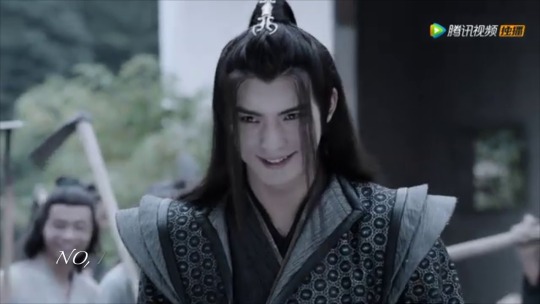
And Wen Kexing, Word of Honor:
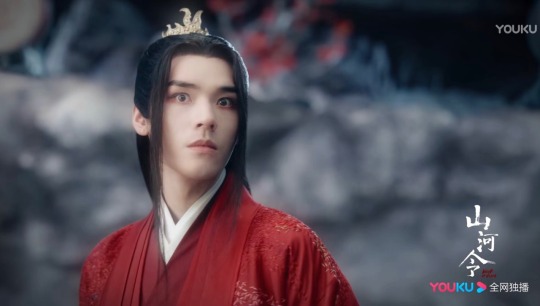
And Journey to the West, Underworld Lord:

However, now with all that cultural context, I can see this choice of acting in a different light. The over-acting and depiction of villainy is over-the-top because it’s meant to inspire that emotion of (this guy is whack, like really). It’s not supposed to be realistic villainy, like how a real person would look if they were these people in real life. To judge it by a completely Western lens is doing a disservice to them I think. You could say that maybe they just can’t act well, but in a Chinese/Japanese/Eastern cultural theatrical context, their acting is actually par for course. It’s even more subdued than the traditional roots of Eastern theatrical performances actually.
This goes for many other C-dramas / Eastern dramas that have these instances of highly emotive performance. It’s a product of hundreds of years of Eastern cultural theatrical/artistic production combined with Western acting styles and cinematography.
Is it cheesy? Maybe. Is it over-acting? Could be, but what is “over-acting” vs what is “enough?” Is that not the distinction between mo and Western realistic imitation? For me, as someone who’s very used to this uniquely different style of dramatic production, I’m not too bothered by it. It, after all, makes me feel such an incredible range of emotions that the acting is just a fun, interesting perk.
Thinking that these dramatic productions were originally seen as extensions of poetry, I can see why the exaggeration is necessary to fulfill what mo means:
If I feel some intent, I must write it - it becomes a poem.
If that’s not enough, I must sing it - it becomes a song.
If even singing isn’t enough, then I sigh, and have to express by dancing - it becomes a performance.
Part 1
#cdramas#jdramas#kdramas#eastern cinema#acting#theatricality#asian cinema#east asian cinema#chinese culture#the untamed#word of honor
59 notes
·
View notes
Text
here, there, and everywhere • graham coxon/reader
this fic is based on two prompts y'all sent me:

and

this fic really tested all of my blur knowledge holy Fuck. blur as talking heads au i guess. how cool would it be if they
1. had a girl bassist instead of the cheese tory dude
2. werent as unhappy as they were in the mid 90s (just a bit)
3. were just a little 🤏🏻 bit more female friendly lets just pretend this is a universe where the blurjob passes didnt exist heh
it took me everything i had to make this sound as realistic as it could be. u know these girls who think they could fix patrick bateman or don draper? perhaps y���all could fix blur
consider this a gift n not only me writing for your prompt, @nottuned! thank u so much for all your support n encouragement n for always bein so sweet 🥺 i hope u enjoy reading it as much as i enjoyed writing it!
let’s see how many references to unfortunate britpop moments y’all can find in this
also i hope i captured the silliness of the gossip and drama in that era well. if you enjoyed it, please leave an ask telling me more! ur feedback is rly important to me 😔✊🏻
tw (?) reader has shitty parents
word count: 7.938 (this one's quite long!)
smut. set in the 90s. au.

You were unlocking your door when you heard your house phone ring. The shrill sound echoed through the empty corridors as you hurriedly unwrapped your scarf, tossing your keys and backpack on nearby furniture as you ran to answer the call.
“Hello?” You answer, panting.
“Y/N?”
“Dave?” You smile, that call was a very welcome surprise. Your friend owed you an answer.
-
A few weeks ago, Dave Rowntree, your music classmate who became a close friend, told you that he had teamed up with two other proficient musicians to form a band. Dave was ecstatic, and every day he had new stories about his new friends to tell you between breakfasts and lunches that you shared between the countless hours of rehearsals. Even though you weren't part of the group, you already felt that you knew Damon and Graham like the back of your hand. Yin and Yang. One was expansive, ambitious, vain, impulsive. The other, shy, introspective, anxious and careful.
Damon Albarn wanted to be an actor, Graham Coxon had a firm foot in the visual arts. One was a fan of grand classical compositions, the other was a Beatles fan. They had been friends since they were children, in a seemingly unbreakable bond. Damon dropped out of his theater class not only because out of a sudden he had found a bigger calling in music instead of acting, but also because he couldn't stand being away from his best friend for so long. You found yourself often imagining their faces and voices while trying to make all of the wild and endearingly funny stories Dave told you more tangible in your head.
It was not long before Dave started dropping little hints that they needed someone else for their project. “It’s not that Graham isn’t good at bass,” he’d say, “but we could do better.” It wasn't at the top of your plans to be part of a band right now, especially as you were preparing intensely to join the Royal Academy of Music, and he knew it. When you mentioned the conversations you had with Dave about the boys on your family dinner, in quiet wonder and timid want of being part of something really exciting, your parents wrinkled their noses. Focus on the greater things, they’d say. Don’t let these boys distract you from your goal.
Our goal, they meant to say. Since you were born, you never knew if the things you wanted were really your will or theirs.
But anyway.
That dynamic went on for a while, until the day Dave invited you to audition for them while you shared a Diet Coke in the tube home.
“Will it take too much of my time?” You asked, coyly.
“Bold of you to assume we’ll let you in that quickly.” He chuckles, amused by your confidence. You playfully elbow him in return. He knew how good you were at what you did, though, and there’s lightness in his tone when he continues, “But no, unless you let it. You’ll probably have to stand up to Damon every once in a while.” He sips the drink, handing it over to you.
“What about Graham? How much is he determined to make it big?”
“Damon’s the one who wants it the most. Graham’s studying Fine Arts at Goldsmiths, so. There’s still cautiousness in him.”
“Huh. Okay then.” You reply, thoughts running wild. “Do we have a time and date?”
“Is tomorrow ok to you?”
“Sure. After our class?”
“Perfect.” The train reaches his station. He ruffles your hair: “See you tomorrow then.”
“See you.”
You don’t tell anything about it to your parents, you just warn them that you’ll arrive a bit later than usual. Dave’s intel was crucial to your choice of songs: knowing Graham was the beatlemaniac and also the rational brake to Damon’s tireless ambition, you knew who to please and have as an ally, so you build an innovative and fresh mashup of Paul McCartney’s greatest basslines to play for them. Of course it could backfire, but you didn’t care. You had a hell of a good ear anyway and if Damon wanted you to play anything out of the blue, you would improvise beautifully over it.
The day comes. You didn’t know why you were that nervous for an amateur audition. You weren’t even sure if it was the right path to follow, given that, depending on how focused Damon really was and how contagious his aspiration was, being part of a band could really take you out of your predestinated course. The reason why you were so nervous, now thinking a little more about it, may be because deep inside, you want your path to be a little less predictable. You didn’t want to fill your heart with hopes that you might make it big and travel all over the world because you didn’t even know them. But… what if it clicks? You knew some people in the scene whose work was getting seriously recognized out there.
Meeting them for the first time was an enigmatic experience. Damon was incredibly brash and cocky - not the first theater kid you’ve met in your life. Graham was way more approachable, though also a bit conceited when pushed just right. You wondered if you’d fit in that boys’ club, and decided you wouldn’t be an easy target for discredit or any kind of shit they might give you. “Took me a while to fully get their trust. You’ll do just fine”, Dave said, out of their earshot.
That gave you more fuel to play amazingly well. Damon definitely wasn’t one to be impressed quickly, but he was, when you finished your set. So was Graham - Graham was starry eyed with your performance, actually. Albarn showed you a song and asked you if you could improvise to it, just as you imagined. Of course you could, on the first play. You even suggested some adjustments to its structure. Your feedback was welcomed and noted.
-
Even though everything went surprisingly well, you still weren't sure if you would be a member of “Seymour”, as they called themselves. (You knew it wasn’t the best name, but you didn’t have a better suggestion at the time so you’ve kept your opinion to yourself.) Graham became eerily quiet out of a sudden and wouldn’t cross eyes with you the entire time you were there. Damon, well, was Damon. Perhaps he thought you were too ordinary and mainstream for deciding to play Beatles when he’s trying to be the new avant-garde Jesus.
But Dave's news was different than you expected. “They really, really enjoyed your audition. As I thought they would.” You can hear the smile in his voice. "When can you rehearse with us?"
-
Months after, on your first gig as a fully formed and integrated band, Damon was hit in the face by a guy twice his size, Graham vomited onstage and you and Dave had to take care of both. A beautiful way to close the already exquisite day you had, after you fought with your parents, got kicked out of your childhood home and gave up on entering the Royal Academy of Music two days after you received your acceptance letter featuring rave reviews of your entrance exam.
Dealing with these boys - no, grown-ass men - was hard, but not completely unpleasant. If it were totally unpleasant, you wouldn’t give up on your entire life to embark on such an adventure.
You - plural you - were so gifted and Damon’s compositions were so good. You could see that artsy pretentious mess of an act going somewhere. Of course, you were a bit lost in your life, but so were they, as you ran from city to city meeting new people and trying new things in your journey to fame.
Loneliness, once a close friend, became a distant acquaintance. One you didn’t know anymore.
You confess you were getting worried, though, with how much money you had left on your savings and how much you were spending lately now that your parents weren’t an active part of your life. Wanting to eat something you cannot dream of buying without that money being really useful in a much more critical situation, not having nearly enough money to replace something important that broke or got torn off was frustrating. Some basic things became luxuries out of a sudden.
One day in particular, you very briefly mentioned that you were dying to eat a slice of chocolate cake, but your voice was so small and everyone was so immersed in their duties you thought no one gave two shits to what you said. Two days later, Graham arrived late at rehearsal with a small chocolate cake in his hands, handing it over to you like it was a completely ordinary act. Nothing in the way he acted told you he expected a reward, it was so natural and… gentle. You knew no one in your band could buy a chocolate cake without it being apocalyptic to their personal finances during that time.
That day, you were assured by fate that feeling lost together was better than feeling guided alone.
-
The band finally got on track - strictly musically speaking. Personally speaking, many contemporaries who followed you at parties and other events described you as an ever-growing odd, annoying and intermittently disarming bunch - and Blur and its members became household names, at least in the UK. It became harder and harder everyday to impose yourself as an entire industry and its target public aimed to tear you down. Men couldn’t understand.
(Graham Coxon was the one who tried the hardest to.)
It was four in the morning. You’ve got used to following your bandmates to hospitals, running away from trouble or knowing when to relish in it. But it was the first time you offered yourself to clean up dried blood from one’s face, given how much you hated seeing the fluid and even fainted when younger whenever exposed to it.
You, so delicately, wipe the saline solution-soaked cotton across Graham’s face, who flinches at the cold sensation on his still sensitive skin. He stares at you with the eyes of a child, and you couldn’t help but give him a slight, warm smile in return, which he retributes. Your face conveyed gratitude and affection towards the one you were taking care of. Your hands still struggled to stay completely still after the surge of adrenaline your body received a few hours ago.
Being the only girl in a massive band, and one the music magazines and mainstream media loved sexualizing, meant having paparazzis in your window in odd hours (not that that’s acceptable in any hour, but you had to lower your standards even more these days), meant having different photographers trying to pressure you to get into all kinds of uncomfortable angles with skimpy-ass dresses and just count on the intervention of your fellow bandmates so they would stop, also having invasive male fans who would try to harass you in any way they could.
Of course the day where one of your bandmates would get into a fist fight with one of these men inserted into these categories would come. And even though they were all protective of you, each in their own peculiar, increasingly contradictory way, Graham’s dedication to it was sometimes commendable.
You were making your way through a small corridor of people on your way to the stage when a random guy cupped one of your breasts. It’s not like the venue was incredibly tight, it could not have been on accident and it made your blood boil. You turned around to scream at him, and Graham, who was just behind you, threw a punch directly towards the man’s face, without thinking twice.
And oh boy, took a lot of people and a sweet amount of time to separate the two after that.
After all was said and done, Graham had a few scratches, a black eye and a cut brow. He kept dodging your many “sorrys”, “you didn’t have to do this” and other expressions of guilt. “You have nothing to be sorry about, he deserved it”, he kept assuring you, like a mantra, just giving in to your pleas when you supplicated to take care of his wounds during intermission and after the show.
“I get why you did what you did, Gra. I hate that you took such a risk because of me, but I understand.” you say, voice cracking from not using it for a while after spending some good minutes in complete silence taking care of him. “However,” you soak another cotton ball in the saline solution a roadie got you, punctuating the word with a squeeze to the cotton to remove excess liquid. “I was worried sick about you. What if he… had a knife or something? You could’ve got seriously injured. Or killed.”
“Don’t worry about me. I’m perfectly able to have a good fight,” after wincing from the contact of the cold wet cotton with his dried blood, he purses his lips in a forced, shy smile, trying to light up the mood. He notices your hands are still shaking from the adrenaline, and takes one of them in his bigger ones, trying to calm you down. The fact that he did this for you, coupled with the fear and how tired you felt of having to go through that kind of situation once again, made you cry-laugh from how overwhelmed you felt.
His expression changes to one of pure compassion in an instant. “Hey, don’t--oh my,” he gets up from his chair to embrace you as you pour your frustrations through fat tears running down his shoulder.
“It’s so exhausting,” you mumble, through sobs. “Now I’m putting you in danger too. I feel like I did and I’m still doing everything wrong. I should be the one giving you a shoulder to cry on.”
“You didn’t do anything wrong! Anything at all, I promise you,” he says, tenderly, running his hands through your hair, still holding you tight. “It was his fault! I decided it was the right thing to do. You’re worth the risk. What people have been putting you through is unacceptable.”
“I’m not worth the risk!” You break apart from his arms, trying to get your point across. “What would I do without you if someone killed you? You need to be more careful!”
The silence hangs heavy between you two thanks to the weight of your words.
“You should’ve asked me before you lunged at him, at least. I don’t know.” You wipe your many tears as you move towards the nearest bottle of water to try to calm yourself down. “It’ll never end. I’m so afraid that these situations will get even worse. That,” you motion at his wounds and dirty clothes, “is a bloody tragedy. It’s a tragedy things escalated to this point. You can’t do that forever.”
“This is just a consequence. And something I would do for you in a heartbeat whenever necessary.”
“Graham, I don’t want you to get hurt because--”
“They hurt you. I won’t let you go through that alone. Besides,” he comes closer to you again. “As I already told you, I can take care of myself, most of the time.” He takes your face in his hands, his fingers so delicately running across your cheeks to dry your tears. You knew that gesture wasn’t his way of asking you for anything you weren’t ready to give him yet. He just wanted you to feel safe. “And I want to take care of you.”
“I’m the one cleaning your wounds.”
“A great partnership, I think.” Coxon chuckles softly, and finally gets a smile out of you. As he always does. “And they make me look cool, don’t you think?”
“Shut up.” You giggle, still feeling too emotional to return to the stage. You sigh: “Thank you for being there for me. You know I’m still not very used to it. Just please be safe.”
The roadie returns, a little flustered by interrupting your little moment together. “5 minutes and you’re back, guys.”
“Okay!” You both turn to answer her.
“I’ll be. No need to thank me for anything, Y/N.” He answers, giving your forehead a little kiss. “Let’s go.”
“Give me two minutes. I’ll be right behind you.”
-
“What’s it like, being the only woman in the band?”
Four eyerolls at once don’t seem to faze the interviewer. She waits for your response.
Apparently the thousand invasive questions regarding Damon’s love life and the same bullshit treatment of women as either rare specimen or sex dolls is what pleases the audience of music TV shows these days.
“What do you think?” is what you say.
“Must be a thrill to have these beautiful boys around you all the time. And we’ve heard you never even took advantage of it!”
You don’t like where this is heading. “Is that… a bad thing? I don’t know what you mean.”
“Perhaps some of our lady viewers might think it is. No judgement though!” She raises her hands. “You do you, it’s just that it’s quite unexpected to see prudes in non-Christian bands. I mean… from what we’ve heard.”
“I’m sorry? What are you trying to say? What did you hear?”
Her tongue clicks while she stares at you with defiance and mischief on her eyes, as she goes a little further and raises her voice so it can overlay yours. “Oh love. You do know what I’m talking about. There’s no need to be ashamed of being a virgin.”
Your cheek burns intensely and the only thing you wished for was for the ground to swallow you whole. Dave and Graham are especially uncomfortable. Damon’s a bit amused. The three knew almost everything there was to know about you. The one topic that surprisingly they didn’t know about is that you’re still a virgin.
They know you’ve been single for a long time. They know that’s part of what draws so much attention and twisted lore regarding you and your past, but that’s not something they felt they needed to know about you at all, and you truly never felt the need to comment about that with any of them, and they haven’t asked. Not even Mr. “the way to be successful in this game is to make all the boys wanna be you and all the girls wanna sleep with you. In your case that’d work in reverse” Damon Albarn.
“Is that even something that should be discussed in an interview about our music? Is that what your boss told you to ask her about?” Dave answers, his tone venomous.
“Musicians are way more than just music. You’re entertainment in every sense of the word.”
“Who told you that about me?” You asked, not sure if you want to know the answer.
“A lovely elderly lady who lives in Elgin Crescent. She knows you so well.”
That’s your mum. That’s how far low your relationship has degraded. You’re not surprised. That doesn’t feel less like a punch on your gut, but you don’t feel like tumbling again. Not today.
“I know who you’re talking about. Tell her I asked her to go fuck herself and burn in hell. In that order.”
“But that’s your--”
“Yes, she is my mum!” If people are going to expose you anyway, then why don’t you do it on your terms? “We’re truly entertainment in every sense of the word, aren’t we. Not everyone’s mum’s a cunt. Some of us aren’t that lucky.”
“You want to be the next Gallagher sister with the spicy remarks?”
“Not sure. But I do want to be the last person you ever get to interview.”
-
The management of the band wasn’t at all surprised your interview became UK’s topic of the week. People were heavily divided between family is family and we shouldn’t hate our relatives and blood isn’t everything, family can be shitty too. Your bandmates were proud of you. The management was angry but tried to understand, and didn’t press you for further explanations. They suggested a two-week break from everything so Blur could rest their image and start a fresh cycle after that, and you gracefully accepted it.
The whole thing seemed so ridiculous the more you thought about it. Did your mum tell the reporter about that gratuitously? What was their conversation like? How did that even happen?
You became the butt of jokes in some places. You saw other famous people doing challenges between them, countdowns, all sorts of crude remarks. What a pathetic, sad chapter of your career.
You dial Graham, and you feel like your heart was about to burst out of your chest.
“Hey, Gra. It’s me.”
“Hey, Y/N.” He sounds pleasantly surprised. “How's it going?”
“Better, I guess. I have to take my mind off all that chaos though. Are you available right now?”
“Yeah.”
“You’ve been owing me a movie night for quite a while now and I miss spending time with you. Wanna come over?”
“Aww. Sure, I--um. Do you want me to bring anything?”
“I’m pretty sure I got everything we need here--ah… I think I don’t have any more beers.”
“I’ll buy some then. See ya in a few minutes.”
Actually, you couldn’t take all that chaos off your mind because that was the only thing in it. You’re feeling so nervous.
The main reasons sex wasn’t a priority for you until now were:
You didn’t have any real opportunities of losing your virginity in your teens. You were impossibly introspective until, like, 3, 4 years ago, and the way your family worked hasn’t really allowed you to get really close to people. Be it boyfriends, girlfriends or just friends. Anything that threatened to take time off the various tasks and classes your parents assigned to you just couldn’t be part of your life. To be honest, you still struggled a bit to form meaningful connections with people thanks to how you grew up.
The moment you stopped being shy, you noticed it was a real man’s world out there, especially in music, classical or not. You didn’t want anyone to think you fucked your way up to the top, you didn’t want any messy affairs. Also, you had yourself, and you didn’t get all of the hype regarding the concept of screwing someone. But apparently there’s a lot you’ve been missing, given the importance people seem to give to it. After that incident, even though you swore to yourself you wouldn’t give in to any kind of misogynistic pressure, that was one that really got under your skin.
You never really found someone who you felt 100% safe with in that sense until the one who’s about to arrive at your house appeared in your life. Bloody hell, and you don’t even have anything romantic going on. By the time you were a Blur member, you’ve fooled around a bit, but not all the way. You knew how to kiss, knew how to touch yourself and even brought manual satisfaction to some random fool you thought you were into one time. But perhaps this is the time to go all the way. Why not? Everyone knew how close you two were. He made you feel special. He was so kind. And gorgeous. And--
You hear a knock on your door. It’s him. Beers in hand, hair somewhat in place, twitchy as ever.
He comes inside and you feel like your legs will give up anytime. It was not the first time he visited you. It was one of many, actually, and he noticed you were acting… different.
“Y/N, are you okay?” He asks after a brief dialogue between you two, after plating some snacks for both of you.
“Graham...” You sigh, being really careful with your words. “What is your perception of me?”
“My perception of you?” He smiles. “I… think you’re great. You’re fun to be around. You’re one of the best musicians I know, if not the best. Why are you asking me that?”
“N-nothing. It’s nothing. Also, I asked the wrong question. What was your first perception of me?”
“Uh… the day of your audition?”
“Exactly. You barely talked to me that day.”
His eyes lower to his own feet. “I was really timid, actually. I wasn’t used to being near any girl, especially one who… w-would spend so much time around me if everything went well.”
You giggle. “I thought you hated me.”
“Never!” his smile turns into a full blown laughter. You melt at his confession. “Also because it seemed like you were trying to read my mind or something.”
“Of course! Because I thought you hated me!” Now that was a laughter you two shared. You do a voice: “‘Why is that pesky girl trying to get in my band?’”
“My goodness, no! I don’t even sound like that - you know what, I changed my mind. You suck. Because, besides the fact you don’t even know what I sound like, you still haven’t told me why you are asking me that in the first place.”
You couldn’t help but notice how he slightly cornered you physically in one of the kitchen corridors. Graham could be really persuasive when he wanted to.
“Okay. Right. Um. I’ve been thinking about some stuff.”
“What, exactly?”
“Everything that happened this month. The great virginity debacle,” you roll your eyes, and he scoffs.
“You don’t own anyone any information about what you do or don't do with your life. Everyone’s being so invasive. That was incredibly childish of the reporter to do, and we talked about that hundreds of times.”
“Yeah, but… you know what, forget it.”
“Tell me, Y/N. I just said that because I want you to know you were not in the wrong.”
“I know. It’s just… I’ve been thinking that maybe it’s silly for me to… keep closing myself for affection. Any kind of affection.”
“What are you talking about?” His brows furrowed in curiosity.
“I’m not sure if it’s the pressure that finally got under my skin, but… I’m willing to learn what all the fuss is about. Maybe it’s silly that I’m still a virgin.”
He bites his lips, still processing what you just said, expression unreadable. Perhaps you’ve treaded a ground you shouldn’t. You step back both literally and figuratively. “I’m sorry I even brought that up--”
“No, no, don’t be.” He assures you. “I’m just… surprised, that’s all. I swear.”
“And...” You know what. You already went too far, so why not go all the way. You’ve already gone way past the point of no return. “I was wondering if… you would… popmycherry?”
His eyes widen, yours still closed. When you finally open them, he’s closer to you again.
If his head was a machine, you’re sure it would be releasing lots of steam and shaking due to overprocessing. You felt like you just ruined everything.
“Y/N, you don’t need to do it if you don’t really want to.”
“But I want it! At first I thought I didn’t, but then I thought...”
“I don’t want to be part of that if you’re just doing it to fulfill weird expectations.”
“But it’s not that. Not just... that. I asked about your perception of me because I really like you, Gra. I think we should be more than friends and I wanted to know what you think about me. And I want to know what the fuss is about, yes, but I’m not telling you that just so I can lose my virginity to prove some point. I’m telling you that because I like you, I want to kiss you, and I think it would be a great idea if you showed me what it’s like. Y-you know, sex.”
“I-I can’t believe it. Did you even have any movie in mind?” His smile’s back, but you’re still not confident about what his answer will be.
“I didn’t. I’m sorry. You don’t have to--”
He sighs. “I was in love with you the moment I first saw you, actually.” He says it like he’s releasing a huge load out of his back, his arms crossed. Now your eyes widen, and you hold your breath without even noticing. “I didn’t want you to feel pressured. I know how you feel, or, felt about relationships, so… there wasn’t any reason for me to tell you that. And what I said about being timid was just half of the truth.”
“Huh?”
“I also was really intimidated by how pretty you looked. You can’t imagine how.”
“No way.”
“It’s true. I felt like I wasn’t even worthy of looking at you, really.”
“You’re joking. That’s mean, Gra.”
“I’m not. I’m really not.” He doesn’t look like he is joking. He looks relieved. “I’m really not. That’s why I’m so surprised by your request.”
“I’m nothing special.”
“You are everything to me. But I can’t accept your offer, not now.”
“Are you… seeing someone? Am I too late?”
“No. Definitely not. I just want you to be sure you’re not doing it because people are saying you should.”
“Graham, I’m a grown woman.”
“I know.”
Graham carefully presses his slightly chapped lips to yours, kissing you for a few precious, heart stopping seconds before pulling away; his voice is impossibly silky when he suggests, “Let’s watch a movie. How about The Godfather? I heard it’s airing tonight. Then, if in two weeks you don’t change your mind, tell me and I’ll be glad to help you with what you want. Do we have a deal?”
“That’s so unfair. I want you so bad.” You whisper.
“Tell me if you still do in two weeks.”
You sigh, defeated. “...Deal.”
-
You definitely notice the subtle shift in Graham’s personality and actions after that fateful night. If you were already close, both figuratively and literally, it now seemed like he would use any excuse to always touch you, be near you, sometimes tease you. The shift was subtle, though, don’t forget it’s still Graham Coxon we’re talking about - the constant “is it okay if”s or “is it alright if I”s were still there, as careful as ever. You don’t even talk about your deal that entire time, or even kiss again - sometimes you wondered if it was even real or just a fabrication of your mind.
The way he now caressed your hand discreetly when you listened to Damon’s ramblings, the way his hands now went directly to your waist when your games became too handsy, the way he seemed to be madly in love with everything you were and still are from the start - made you realize you were ready for this man to be a consistent part of your life.
The dust of the controversy was settled, and your own intentions were 100% clear to you now. The societal pressure has waned. The need for Graham to be your first persisted. After exactly 2 weeks have passed, you call him again, yearning to share the answer with him.
One beep.
Two beeps.
Three beeps.
Four beeps. “Hello?”
You release a sigh hidden deep inside of your lungs. “Graham, it’s Y/N.”
“Oh. It’s been two weeks.” You could hear the contemplative tone of his voice.
“...Yeah. That’s precisely the reason I’m calling you.”
“Do you still want to…?”
“...Desperately.”
“Ok.” He chuckles, flustered as hell on the other side of the phone, probably one of the prettiest sounds you’ve ever heard. “Right. Ok. Your place or mine?”
“I think there’ll be an element of mystery if I go to your place this time.” You lose some of the constraints this silly shyness has been tying you on. “Do you have everything we might need there?”
“We don’t need a dungeon, you know.”
“The basics.” You make your smile heard.
“I do have… I do have the basics.”
“See you in a few minutes then.”
“Will you want to… ease into it? Or just go straight to it?”
“God, don’t make it awkward!” Your cheeks burn, your smile turning into contagious laughter. “Maybe… I don’t know. Ease into it, I guess? A movie night… but with s-something else?”
“Okay. Sounds good.”
“Alright then. See you.”
“See you.”
-
You don’t choose any particularly fancy or sexy clothes, instead settling for a slightly oversized yellow striped shirt he gave you as a birthday present some months ago and some skirt that fit you well. He wasn’t one to lavish his loved ones with gifts all the time, but few things were as precious as the look on his face whenever he saw you wearing something he gave you or, hell, even eating something he paid for you. You’re thrilled to see it again when he opens the door for you, it easing some of your deepest doubts.
2001: A Space Odyssey is already playing on the TV when you arrive. Despite it being one of your favorite movies of all time, and his, you’re not mad it was already halfway through when you arrived. It wasn’t your main priority to rewatch it for the 17th time tonight.
He offers you some wine, which you accept to ease the nerves. You sit on his couch, and he shares the cozy space with you, now mindlessly throwing one of his arms around your shoulders. You cuddle up to him, and everything seems peaceful in the world for a while.
The tip of his fingers softly caress your lifted knee, absentmindedly. You couldn’t help but notice how well his body fits with yours, how your skin was apparently made for him to touch, and the anxiety rumbles in your stomach like a storm in a wild wavy sea. After some minutes, you raise your head, his big brown eyes meeting yours as if asking you a silent question. You leaned up a bit more to press your lips to his, in a silent answer. The sweetness in him makes this moment as precious as every other moment you ever shared with him. His hands enter your hair, making you shiver a bit from the unfamiliarity and the electricity of it all - but it doesn’t sway you from deepening the kiss, wanting more of his taste, more of this, more of him.
“Do you wanna take this to the bed?” He whispers, after noticing your moans were becoming more frequent and needy. You nod, and you are taken by surprise when he carries you bridal style to it, hiding your excited giggles in his broad shoulders.
Graham wasn’t exactly the most organized man in the world - so the fact that his bedroom was now impossibly tidy was something that positively caught your attention. He put some planning into this. He lays you down and you part your legs, beckoning him to meet you between them. He does, and you go back to the breathtaking makeout session. You notice he’s holding himself back a bit, taking his time, his warm tongue moving smoothly, not hurriedly, against yours. His self control falters a bit though, given how he can’t stop grinding against you. You follow the rhythm of his hips a bit timidly and not nearly as in sync as you’d really like, though the pressure his covered cock is creating against your core can already be felt and some particular thrusts are able to fill at least partially the aching, wet need growing within you.
“How do you feel about oral?” He asks, breath warm near your ear, his voice raspy and spent by his desire for you.
“Um… It would be my first time receiving or doing it.”
“Would you like me to go down on you?”
“Wow. I never thought I would hear you saying something like that.” You smile, still assimilating the situation you’re in, trying not to show how badly his voice is affecting you. “Sure.”
“I never thought I would get to propose this to you. Aren’t we full of surprises lately.” He smiles back, warmly. He notices your hands trembling a bit from how anxious you are while you’re taking off your underwear with his help, and as he lowers himself to where you need him most, he takes your hands in his as an act of reassurance. “Tell me what you like. Tell me if what I’m doing works for you. I want this to be a great experience.”
“You want me to get addicted to you, that’s what you want,” He chuckles, lovingly kissing your thigh as a reply. “Okay, Gra. Guess I’ll find out along the way.”
You quickly take a peak below you to see the lower half of his face disappear in the middle of your thighs. The sight alone sets your fire ablaze, as he hooks his arms around your thighs and lifts you closer to his mouth, his lips ghosting over the curls between your legs tantalizingly and his breath catching when your hips jerk forward.
As he begins his ministrations, you immediately notice it’s unlike anything you’ve ever felt. That feeling was completely alien to you. It was even wetter than you expected, and weird, but powerfully pleasant. Before this exact moment, you had a firm belief that hardly anyone else would make you feel the same way, or better, than you do yourself, but apparently you were very wrong. Thankfully you were wrong. “My god,” you gasp as the flat of his tongue drags over your folds, too much and not enough, and you jerk at the contact. “This is great. So weird, but-- great.”
He moans at your response, his movements carefully enthusiastic. He works his tongue between your folds and traces up to curl the tip of it around your clit, and it’s quite endearing and madly arousing to see how he eats out you like you’re the sweetest and tastier dessert he has ever tasted. You involuntarily buck against him with a desperate sound the moment he moves his tongue and lips in a particularly wicked way, something that definitely doesn’t go unnoticed by him, but you still feel the need to highlight in case it didn’t - “That. Keep doing that, please,”
And he does. The building of this climax is also different than the ones you already had by your own hands, and is more coy. As he sees the drops of sweat sliding along your soft skin and the expressions on your face as you get lost in this new but enchanting sensations, his hesitation and self-control fades away; there’s nothing uncertain in the way he buries his face in your cunt now, nothing restrained in the groan he lets out as he devours you and drinks you down as if you’re the first stream of water he has seen in days.
His tongue glides deeper in your folds again and again, swirling up through the wetness you’re coated with to tease at your clit while he grunts and strains closer, squeezing your thighs with both hands tight. The wave of heat inside of you is cresting so fast, you don't even know how to tell him, how to signal that you’re nearly done for and, in the end, it happens too fast to even try. He sucks at your clit, circling it with his tongue, once, twice, and then you’re crying out, shaking underneath him, trying to keep your thighs from clenching too hard around his head as he laps you through it with with urgent whimpers and moans, as if he cannot have enough of you.
You’re still trembling when he rises, the look on his face revealing to you how proud he feels by making you feel this way. It looks so good on him.
You fail miserably at the simple task of connecting words together after that, choosing instead to collect your remaining strength, prop yourself up and beckon him again to keep kissing him and learn, through his talented tongue, how you taste. He kisses the thin fabric of the shirt at your chest that covers you from view, your throat, your jaw, and before he reaches your impatient lips, he notes, sinfully, “Seems like you enjoyed yourself, love.”
“That was… unbelievable. Stars, I want to make you feel good too. Please show me how.”
“Keep kissing me,” he begs, voice still strained from how aroused he is. “I want to be inside you so bad. Let’s get you prepared.” You’re still so sensitive, you tread on overstimulation when his fingers lightly touch your clit, making you break the kiss in a hiss. He traces a line on your folds, inspecting the impact his mouth had on you. “So wet for me.”
“Bit slower, Gra,” He complies to your breathy plea, his fingers now more tame as he slowly spreads your wetness throughout your pussy. He stretches towards the nightstand to grab a bottle of lube, interrupting his contact to spread some on his fingers before unhurriedly slipping his middle finger inside of you. The coldness of the gel makes you shiver in surprise, the easiness brought by it very welcomed. Again - the sensation is odd. Completely unfamiliar. The feeling of having something inside of you for the first time, going further than you ever dared to try, probing, exploring; the coldness of the lube clashing against your burning hot cunt. But it also felt nice. The focused look on his face was adorable, he looked like he was a scientist in the middle of very complex research.
Despite the panting, the messy hair and the fire in his eyes.
Your body already has a lot of new sensations to process simultaneously, so when he asks you to take off your bra and shirt so his tongue can work on your nipples - which you gladly accept, you feel like you’re on sensual overload. His tongue, again, so talented, takes your mind off the slight burning you feel when he introduces his ring finger to your soaked, throbbing core, his focused, carefully overpowering and constant stimulation driving you insane.
“Does it feel good?” He asks, voice muffled by your breast. You nod, carried by the wave of pleasure sweeping you.
“Yes. God, yes.” You pant, tangling your fingers tightly on his thick hair as an encouragement, a desperate sound escaping from your lips the moment he reaches a certain point within you you didn’t even know existed, hot mouth continuing to lick and suck your nipple. Even though you were spent by your last orgasm, he was indeed getting you addicted to those new feelings, and even though this was heavenly, truly heavenly, you needed more. “Gra, I’m ready, I think.”
“You sure?”
“Yes. Please.”
Releasing your nipple from his lips with a sounding pop, he eagerly frees himself from his trousers - hard as a brick - and puts protection and lubrication on, swiftly positioning himself between your thighs while stroking himself to the sight in front of him. You motion to take off your skirt, and he holds your hand, not letting you. “Don’t. It’ll be really hot to fuck you in this.” He confesses, giving your forehead a kiss in a very different context than before. He aligns his forehead with yours, each of your lips just barely touching while you breathe each other’s air. He looks deep into your eyes, slowly running the tip of his cock between the slick folds of your pussy, coating himself in the remnants of your pleasure. “Do you trust me?”
You trust me to know your limits? Not to go any further if you don’t really want me to?
“Absolutely.”
The only response you get from him is a shuddering, helpless moan into your mouth and you hold him tighter to you, grinding your still sensitive cunt up against his cock while he pulls hard at the soft fur next to your head. You feel your soaking pussy lips part around the solid curve of his length and gradually coat the underside of him in slick with every gentle circle and roll your hips make, as he finally pulls away from your mouth to drop his forehead to your neck. He then, very slowly, penetrates you, stopping when he hears the noises you make indicating you’re struggling to adjust to his presence. Out of everything you’ve felt in the last minutes, this was by far the most painful sensation. “This-- is new,” you note, your face completely incapable of hiding the discomfort. He also notices that.
“Are you okay? Do you want me to stop?”
“It’s okay. I’ll get used to it.”
“It’s not supposed to be about endurance, you know.” He says, a bit breathless and worried, caressing your hair. “Tell me when it’s okay to move. Or if you feel too much pain.”
After some long seconds and some deep breaths, you say: “Okay. Go on.”
“As you wish.”
He moves inside you at a very slow pace, the lubrication clearly making it easier for you to handle it. It still hurts, significantly, but the sensation of being filled is also surprisingly arousing.
His hand moves to your sensitive clit again in small, measured circles, your little moans being a mixture of the pain of penetration and the sheer ecstasy of seeing him falling apart because of you. The way his chest heaves while the drops of sweat start pearling his fair skin, the furrowed brows and broken groans, the thickness of him as he rests heavy up against your entrance, the way his voice presses deliciously tight in his throat as he gasps out into the quiet room - everything’s making your chest burst in love and satisfaction. You tighten your grip around him and roll your hips up into his cock, letting it break you open nice and slow; it stretches you wide with a deliciously sharp fullness and pleasure rips through you, and Graham becomes even more vocal as he picks up a steady and gradually faster pace. He turned all of your keys, it’s about time you turn some of his.
“Graham, deeper,” you whimper, continuing to tighten your legs and hoist yourself up, lifting your hips to take his cock deeper inside you. His name rips itself from your throat while Coxon clenches his jaw and starts to lose himself in the pleasure, holding you down into the bed while he allows your desperation to guide him to the perfect angle and speed to sate you. He found denying you to be impossible.
He snarls and curses as he holds you down and rails you, determined to make you sing again before he finishes, and to his delight, your heightened sensitivity gives him what he wants. And this time, he couldn't hold on.
Graham kisses you one last time as he groans and gives in, head dropping to your neck again. You didn’t reach a second climax, but stars, what an experience you just had.
When he comes back to himself enough to realise he still had you practically folded in half, he carefully pulls his softening cock free, taking the condom off and taking the strands of hair out of your face as you struggle to catch your breath. You suggest a shared bath, a suggestion he gladly accepts.
Too tired and too sore for pillow talk, comfortable silence falls as your hand finds his, and you lay, listening to each other’s breathing slowly settle.
I could get used to his little snore on my chest, is the last thought that twinkles on your mind before you fall asleep snuggled with him.
#graham coxon#alex james#damon albarn#dave rowntree#blur#britpop#smut#imagine#reader insert#graham coxon x reader#graham x reader#y/n#fluff#au#fanfiction#blur band
243 notes
·
View notes
Text
Alright, taking a breather from my Eclipse posts to handle a couple things! (Long post!)
1) New ep of Kabe Koji: LOVELY. Ooooooh, the sloooooooowww burn. Mamocchi’s emotion at touching Issei and inspiring him. Issei’s slow growth into leadership and determination. These characters are taking their time with showing their facets. I’m really loving it.
2) Japanese Twitter (and English Twitter reporting on doramas) have noted that the show Silent is quite popular right now in Japan, so I’m picking it up on Viki. Watched the first episode last night, and it is just lovely, reflective of a lot of what I like about doramas and Japanese literature. The pace is very much akin to Shinya Shokudo -- it takes its time with telling its story. It focuses on a young woman who is about to move in with her boyfriend, a high school friend. But she runs into another high school classmate -- her ex-boyfriend, who had suddenly dumped her after graduation. While she thought she had been dumped for another woman, her ex-boyfriend had actually lost his hearing. I’m only through episode one, and there are three on Viki so far, but I’m going to dive into this -- I feel like the pace and storyline are super calming, and the acting is wonderful so far. The lead actress is Kawaguchi Haruna, who I haven’t watched before, but she’s splendid.
I’m so appreciating the increase in dramas that feature characters with disabilities in lead or prominent roles -- Drive My Car, Extraordinary Attorney Woo, and now (for me) Silent. I’m only through episode one, but it seems like this art is being respectfully and deeply done. It’s a nice foil to the intensity of The Eclipse, and I think I’m picking up Big Dragon once The Eclipse is over, so considering how insane Big Dragon looks, I’ll need a calmer dorama to balance things out!
3) OMG, I am FINALLY publishing this review: Three Star Bar in Nishi Ogikubo, yay!
I finished this cute mid-season 2021 dorama much later than I expected; I started it last month, and had to pause while my partner had COVID. But this six-episode series was otherwise a quick watch. I’m going to offer some gentle criticism, but this show did help me cross another dorama off my Machida Keita rabbithole list.
The show focused on three former high school classmates, now adults, who take over the bar of the deceased grandfather of one of the classmates. The bar focuses on classic cocktails and only serves canned food (somewhat of a common occurrence in shows about food in Japan). Machida as Amamiya is a former salaryman; Fujiwara Kisetsu as Nakauchi is a former high-end chef who transforms the canned foods into unique dishes, and Morisaki Win as Kobayashi is a struggling author and current owner of the bar.
So I think that this dorama would have actually been slightly better if it had been a fall or early winter dorama, which sounds kinda of weird, but hear me out: the three main actors are all amazing in their own right -- we’ve seen them in other works that totally showcased their acting chops.
[Having now watched a couple Machida works, and with more on my list, I’m really getting convinced that Cherry Magic was his prime acting showcase of his career so far. Watching Teppachi! was fine, shrugs, and Super Rich is going along (Akaso Eiji outacts Machida in Super Rich), but those shows aren’t challenging, or like, dramatic. Live Like a Girl, Alice in Borderland, that taiga he was in, and probably some movies I’m missing, may prove me wrong, but I gotta watch them first before I judge. I think we were deeply spoiled by the actual quality of the filming and writing of CM, regardless of its BL status, for both Machida and Akaso.]
Anyway, I think that if Three Star Bar were a fall or early winter show, it may have been written with a little more depth -- instead, I think it served as a mid-season quick filler for MBS. I think the three guys (sparkles sparkles, they were all cast together for a reason) were ultimately underutilized, and the customer focal points of each episode were slightly weak and hyperbolized. There was a lot of potential -- the dorama was sweet, but the writing was on the edge of something much more complicated and interesting that didn’t quite get there.
I wrote earlier that episode two punched me in the gut -- it was an episode about an actress-turned-mother who was struggling with balancing her career and raising her child. Lord, can I relate.
So I think that episode could have really gone places! Japan has deeply entrenched issues with supporting career women who become mothers. I think the episode documented the actress’s struggles well. But the guys were left to respond kind of with....not a lot. The actress’s husband comes to the bar and says, “we’ll manage.” Like, cool, but give us more. What I wanted to see was how the husband would compromise himself and his family’s structure to accommodate his wife’s career -- it wouldn’t have taken too much more writing to get to that point. Or the guys talking about their own views of this problem more deeply.
I think I’m being critical enough of this show because the potential for human revelations in the context of being alone in a quiet bar are so high. I’m working out in my head a separate meditation on the beauty of eating and drinking alone, and how Japan handles this so beautifully in their many shows about the topic. I really wanted Three Star Bar to join those ranks, but ultimately, the dorama was designed to tell a different story.
For the sake of that different story -- getting three cute classmates together to figure out their early mid-life crises as a team -- it was a sweet show, especially the last episode, with an ex-pat coming back home to Japan to discover her father’s life in the old bar with Kobayashi’s grandfather. I truly do love shows that showcase food and cocktails, and honestly, I think Machida as a bartender did the best he could with what he was given from a writing perspective.
And Amamiya’s and Kobayashi’s life revelations at the end were satisfying. Amamiya’s character was written as a little milquetoast, but -- the guy clearly need to move away from society’s demands that he turn into a run-of-the-mill salaryman. By finding his life in the bar and living creatively, Amamiya took a risk that a man like himself would have otherwise likely struggled to accept. The true winner of this show, in my opinion, was Morisaki Win as Kobayashi. His Kobayashi was the perfect brooding foil to Amamiya’s cheerfulness, and I think Kobayashi’s revelatory story of conquering writer’s block did nail what a quiet bar inspires -- aloneness can oftentimes bring light to darkness.
I would recommend this as a quick watch! If you LOVE shows about people sitting at bars and working out their very deep issues, Shinya Shokudo is the dorama for that; but Three Star Bar is perfect for a fast binge. AND, SWEETLY: two cute future BL cameos are in this, with Nishigaki Sho as a young Amamiya, and Matsuoka Koudai from beloved Kabe Koji as a fellow chef. Nishigaki playing a young Amamiya was particularly cute and made me giggle; I wonder what Minato Akira/Rokkaku would have thought.
#three star bar in nishi ogikubo#machida keita#morisaki win#fujiwara kisetsu#nishigaki sho#matsuoka koudai#silent#kawaguchi haruna#meguro ren#kabe koji#kabe-koji-nekoyashiki-kun desires to be recognized#kabe koji nekoyashiki kun desires to be recognized#issei x mamocchi#mamocchi x issei
6 notes
·
View notes
Text
Great news for our gender critical friends in the UK, Maya Forstater won! And not only did she win, but gender critical convictions are now protected!
PR below:
Gender-Critical Beliefs are Worthy of Respect in a Democratic Society
In a landmark judgment handed down at the Employment Appeal Tribunal in London at 10:30 am, Mr Justice Choudhury overturned an earlier judgment of the Employment Tribunal, which had declared that gender-critical beliefs are “not worthy of respect in a democratic society”, and were therefore not protected against discrimination. The Employment Appeal Tribunal substituted a finding that gender-critical beliefs are a protected characteristic under the Equality Act 2010. Those who hold such beliefs are now legally protected from discrimination.
The ruling was handed down by Mr Justice Choudhury, the President and most senior judge of the Employment Appeal Tribunal. He found that in 2019 the Employment Tribunal had erred in the case of Maya Forstater v CGD Europe and Others, in its application of the legal test for whether a philosophical belief is protected by the Equality Act 2010.
Sitting with two lay members, Judge Choudhury ruled that under the European Convention on Human Rights, only extreme views akin to Nazism or totalitarianism are excluded from protection on the basis that they are not worthy of respect in a democratic society. The Appeal Tribunal held:
“The Claimant’s gender-critical beliefs, which were widely shared, and which did not seek to destroy the rights of trans persons, clearly did not fall into that category.“
Mr Justice Choudhury said:
“It is clear from Convention case law that…a person is free in a democratic society to hold any belief they wish, subject only to ‘some modest, objective minimum requirements’.”
The judgment directly contradicts the views of Stonewall, the lobby group that advises over 850 major employers in the UK, including many government departments, universities, police forces and schools, covering 25% of the UK workforce.
Stonewall argues that the only acceptable view that can be publicly expressed is that “trans women are women, trans men are men and non binary people are non binary”. Any belief to the contrary – such as that now protected as a result of this Judgment – has been denigrated as bigoted and hateful. Nancy Kelley, Stonewall CEO, recently compared gender-critical beliefs to antisemitism.
The Equality and Human Rights Commission (EHRC) and the Index on Censorship both intervened in support of the view that gender-critical beliefs are protected by the Equality Act.
Mr Justice Choudhury noted:
“The Claimant’s gender critical belief is not unique to her; it is a belief shared by others who consider that it is important to have an open debate about issues concerning sex and gender identity.”
The case came to worldwide attention in December 2019 when J.K. Rowling tweeted in support of Ms Forstater. In her tweet, Rowling said:
“Dress however you please. Call yourself whatever you like. Sleep with any consenting adult who’ll have you. Live your best life in peace and security. But force women out of their jobs for stating that sex is real? #IStandWithMaya #ThisIsNotADrill”
Others who have publicly supported Ms Forstater include MP Rosie Duffield, Baroness Tanni Grey-Thompson, Lord Philip Hunt, athletes Martina Navratilova and Sharron Davies, actor Joe McGann, writers Joan Smith and Trevor Phillips, and broadcasters Jenni Murray and Jonathan Ross.
Ms Forstater, a researcher and co-founder of the new human-rights campaign group Sex Matters, said:
“I am delighted to have been vindicated. I lost my job simply for expressing a view that is true and important, and held by the great majority of people in this country: sex matters.
Being a woman is a material reality. It is not a costume or a feeling. Institutions that pretend sex doesn’t matter become hostile places for women, in particular. After this judgment, employers and service-providers that ignore sex and silence women who object, need to consider whether they are acting unlawfully, and the substantial legal risks they face if they do not change their approach.
Forstater’s beliefs, now recognised as protected philosophical beliefs by the Appeal Tribunal, include that:
“There are only two sexes in human beings: male and female. This is fundamentally linked to reproductive biology.
“Males are people with the type of body which, if all things are working, is able to produce male gametes (sperm). Females have the type of body which, if all things are working, is able to produce female gametes (ova), and gestate a pregnancy.
“Women are adult human females. Men are adult human males.
“Sex is determined at conception, through the inheritance (or not) of a working copy of a piece of genetic code which comes from the father (generally, apart from in very rare cases, carried on the Y chromosome).
“It is impossible to change sex or to lose your sex. Girls grow up to be women. Boys grow up to be men. No change of clothes or hairstyle, no plastic surgery, no accident or illness, no course of hormones, no force of will or social conditioning, no declaration can turn a female person into a male, or a male person into a female.”
“Under the Gender Recognition Act 2004, a person may change their legal sex. However this does not give them the right to access services and spaces intended for members of the opposite sex.”
After the original six-day hearing in 2019, Judge James Tayler had concluded that Ms Forstater’s belief was “absolutist” and would result in her “violating the dignity” of, or “creating an intimidating, hostile, degrading or offensive environment” for, transgender people. Although Ms Forstater had told her employer that she would “respect anyone’s self-definition of their gender identity in any social and professional context” and had “no desire or intention to be rude to people”, the Center for Global Development claimed that her beliefs meant that she would indiscriminately “misgender” people at work, and that her presence in any workplace would make it unsafe.
Mr Justice Choudhury rejected this entirely.
He stressed that his judgment does not mean that “those with gender-critical beliefs can indiscriminately and gratuitously refer to trans persons in terms other than they would wish. Such conduct could, depending on the circumstances, amount to harassment or discrimination.”
On the question of pronouns, he found that while Ms Forstater would usually use preferred pronouns out of politeness, she would not do this “whenever she considered it appropriate not to do so”, for example in relation to single-sex services, and that this was not necessarily harassment.
Ms Forstater was represented by Ben Cooper QC and Anya Palmer of Old Square Chambers, and Peter Daly, a partner at Doyle Clayton Solicitors. Mr Daly said:
“This is a landmark judgment, holding great significance. It is one of the most important appellate free speech judgments handed down by a UK court in many years. As well as the extensive legal implications for equality and discrimination law, it is a recognition of the unlawfulness of discriminating against people – in practice, overwhelmingly women – who hold gender-critical beliefs.
“The implications of this Judgment are vast. It is not only of major significance to the employment sphere, but to goods and services, education, associations and political parties, and to the way in which we interact and are treated by the state that governs us. By rejecting the practice of people illegitimately labelling as hateful statements with which they merely disagree, and by clarifying the process for recognising which philosophical beliefs are protected from discrimination, it will hugely improve the way in which social and political discussion is conducted in the UK. By virtue of the centrality of the European Convention on Human Rights to its reasoning, the Judgment will also have this effect internationally.
“The judgment is testament to the ability of counsel, Ben Cooper QC and Anya Palmer of Old Square Chambers. They marshalled complex arguments and evidence with the utmost skill and persuasiveness, and they are due every accolade.
“Primarily, however, this judgment is testament to the fortitude and determination of Maya Forstater. She has endured two years of unspeakable vitriol, simply for pursuing her legal rights from which society will now benefit. The judgment she has now received reaffirms the legal protections of everyone engaged in the discussion of sex and gender, regardless of whether or not they agree with her, and indeed strengthens protections for everyone who holds a philosophical belief of any kind. This is Maya’s achievement.”
Maya Forstater said:
“My judgment comes after a two-year battle that has been supported by thousands of people. It is a win for millions of people, and for democracy. No one should be bullied in their workplaces, universities or schools, or removed from social media or political parties, for stating the basic truth about the sexes and believing their own eyes. I am proud to have been the person who got these legal rights recognised, and grateful to everyone who spoke up and supported me.”
36 notes
·
View notes
Text
Anonymous asked: Thoughts on Jane Birkin? - Talented elegant actor-musician-model? Overrated at everything but she was pretty? Or, never thought about it, but she did design a nice bag for Hermes?
My thoughts about Jane Birkin is that she is and will always remain an all round feminine icon. Plain and simple.
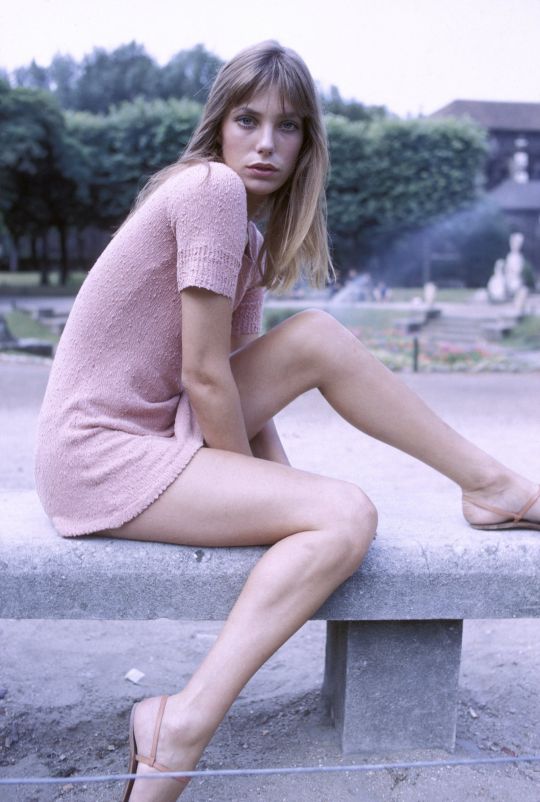
That’s not just my contrarian view because she was an icon that overlapped into my grandparents’ and parents’ generation of the late 60s and 70s but it’s also the view of many French today too. I knew of her because her songs alongside Françoise Hardy and other French chanteuse were always playing on my parents stereo system growing up overseas. Indeed so well-documented is the love affair between Jane Birkin and Serge Gainsbourg, that to picture it retrospectively is to watch a flickering series of film stills in one’s mind. Enter the young British actress in 1970s Paris, basket swinging nonchalantly from one arm, baby daughter clasped carefully in the other, dancing down Boulevard Saint-Germain with the thoughtful French musician’s adoring figure at her side. They loved, smoked and fought fervently, their ten-year-long affair an archetype of that between musician and muse in bohemian Paris, and 40 years after its dissolution, the French still can’t get enough.
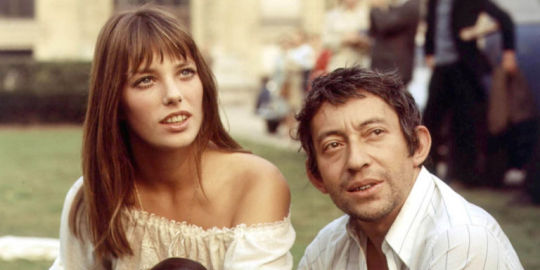
As you allude to in your question, she has famously said of herself and Serg Gainsbourg that, “He was a great man. I was just pretty.” Which has led a small minority - especially those in her native England - to be dismissive of her as a long forgotten pretty face of the 70s and who was over-rated because she was nothing without riding on the coat tails of the crooning bad boy, Gainsbourg. On the face of it it was a very disingenuous remark to make because Gainsbourg was indeed a great man (as a musician and French cultural male icon) but she was so much more than a pretty face. I strongly suggest that she was just being her usual self-deprecating Anglo-self and one who remains to be a tad embarrassed at 73 years old to be continued to be lauded as a genuine timeless French style and chanteuse icon.
No one can doubt that Jane Birkin has always had some talent as an artist. Birkin has enjoyed a long career in the arts as a singer, songwriter, actress, and director. Her longevity is one proof of her staying power. Arguably though, it is her reputation as a style icon, and more specifically being the namesake of the iconic Hermès Birkin bag for which she is best known today. She might well have been Gainsbourg’s baby doll (his words) but she was very much her own popular muse and actress.
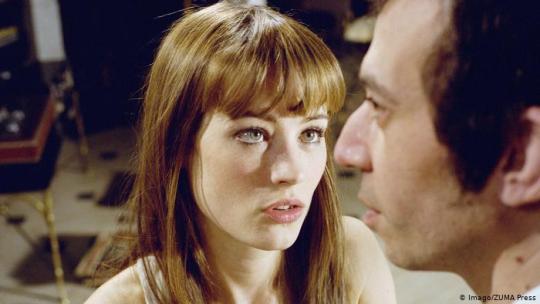
This may surprise many but Jane Birkin has appeared in over 70 films over several decades. As an actress it is often forgotten how good she is because most of her films were made in France and she rarely did films outside of France.
She was already known even before she hooked up with Gainsbourg. She was born in 1946 to an actress mother, Judy Campbell, and her Royal Navy lieutenant-commander and spy, David Birkin. Her mother was an acclaimed actress of her generation and muse to the older Noel Coward. She had a typical upbringing that one might call comfortably posh upper middle class. She was already married at 17 to film composer, John Barry (yes, the same John Barry who composed all the music for the James Bond films and other Hollywood films (Out of Africa, Dances with Wolves, Cotton Club etc) in 1965 but divorced in 1968 with custody of their daughter. Birkin quickly became part of the swinging London scene in the 1960s and appeared briefly in a handful of films.
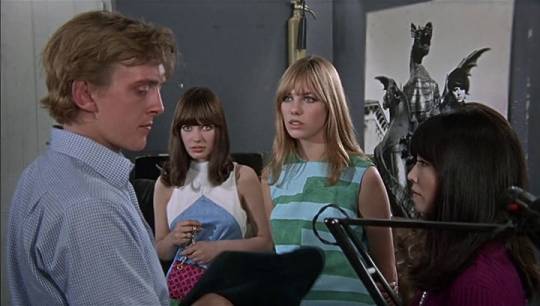
Birkin was already well known but it was her nude turn in Michelangelo Antonioni’s 1966 film Blow-Up that really put her on the map. Even today it’s seen as one of the iconic films of the swinging sixties.
She famously arrived in Paris unable to speak French with her newborn daughter in her arms. The story goes that she was offered the lead role in the 1968 French film Slogan alongside Gainsbourg after sobbing through her screen test. Starring alongside Serge Gainsbourg, Birkin performed with him on the movie’s theme song. It was on that film set that they would begin their truly passionate relationship as well as artistic collaborations throughout the 1970s.
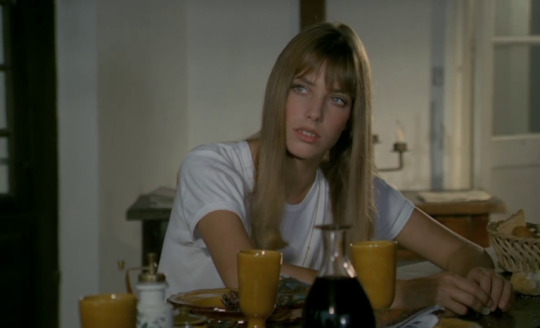
Indeed a year later in 1969 they both released the song that has forever defined them both to non-French people around the world, the duet “Je t’aime…moi non plus” which was met with scandal and disapproval by the Vatican and banned in many countries.
It may have solidified Birkin’s status as the British-born emblem of French chic but in all honesty it also drowned out her notable acting talents. Although Birkin took a brief hiatus from acting to return as Bardot's lover in the 1973 film Don Juan or If Don Juan Were A Woman (for which she got rave reviews because she held her own against Bardot),
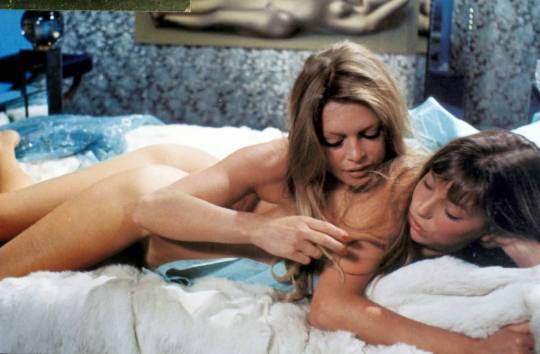
it was only until 1975 in Gainsbourg’s own first film Je t’aime…moi non plus that her acting was properly honoured. Again, because of the damn song, people forget that she was nominated for Best Actress César Award (The French version of the Oscars or the Brit’s version of the BAFTAs). To be nominated for a César as best actress in a culture of truly talented actresses is saying something.
This wasn’t a flash in the pan. She was nominated again in 1984 for Best Actress César Award for her role as Alma in La Pirate - directed by her then partner, Jacques Doillon with whom she did another critically acclaimed film La Fille Prodigue (1981). Her work led her to work on stage with critically acclaimed directors such as Patrice Chéreau. She worked with director Herbert Vesely on Egon Schiele Exzess und Bestrafung in 1980, appearing as the mistress of Austrian artist Egon Schiele, played by Mathieu Carrière. Jacques Rivette collaborated with her in Love on the Ground (1983). The jury of the 1985 Venice Film Festival recognised Birkin's performance in Dust as amongst the best of the year, but decided not to award a best actress prize because it was decided by the jury that all of the actresses they judged to have made the best performances were in films that already won major awards - Dust won the Silver Lion prize so she lost out.
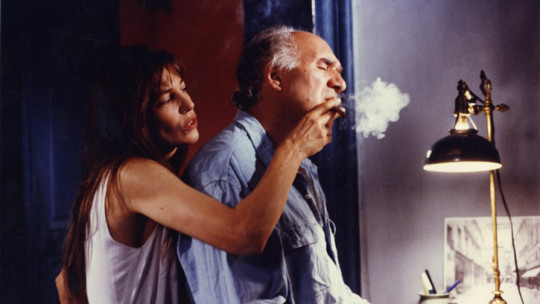
In 1991 she was again nominated for a César Award but this time as best supporting actress in the classic La Belle Noiseuse directed by Jacques Rivette and starring Michel Piccoli and Emmanuelle Béart.
She did of course English films but much more sporadically. She put in a famous turn in both the delightful Hercule Poirot movies starring Peter Ustinov, Death on the Nile and Evil Under the Sun. She also appeared in Merchant Ivory's A Soldier's Daughter Never Cries (1998) (which also used her song "Di Doo Dah”). In 2016 she had the lead role in La femme et le TGV, a short film directed by Swiss filmmaker Timo von Gunten. The film was nominated for an Academy Award for Best Live Action Short Film. I believe after it was widely reported that she had no plans to return to acting.
I think it’s the parochialism of the Anglo cultural world that has led to this misconception that she wasn’t an actress of note when in fact she has always been up there with the best of French actresses of her generation.
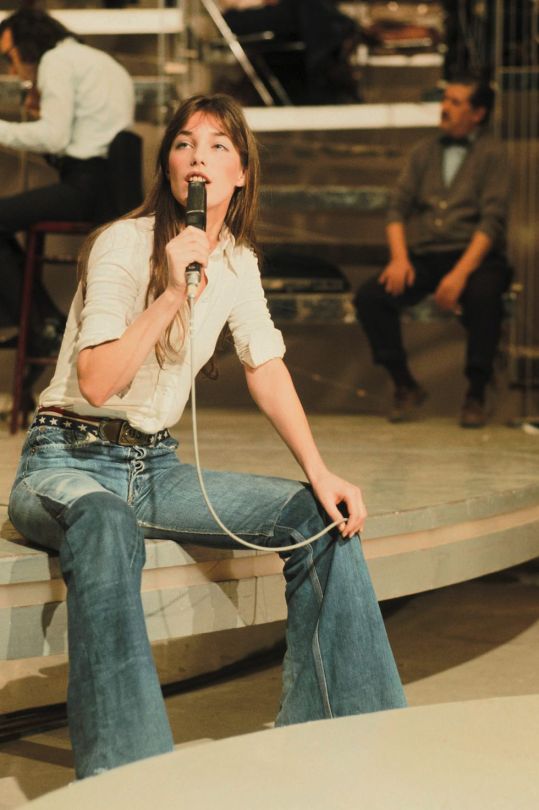
As a singing icon she has been frozen in time. Her fame for one song have clouded a proper critical appraisal of her singing talents. And I think here I have to be honest and say that her critics - from a purely singing technical point of view - might have a point her being over hyped. Not that Jane Birkin ever said she was a great singer as she described herself self-deprecatingly as singing through more keys than a locksmith.
As a singer, Birkin is of course is known for that song that cheekily and perhaps even enviously reinforces the tropes the non-French world have about the French and amour. In 1969, she and Gainsbourg released the duet "Je t'aime... moi non plus" ("I love you ... me neither"). Gainsbourg originally wrote the song for Brigitte Bardot. But Bardot famously declined to sing the track because she found it "too erotic" and she was married at the time.
Although Birkin started out in films, she preferred to focus more on singing than acting. This was primarily because of Serg Gainsbourg who saw Birkin as his muse and wrote songs for her. She released an album in 1975 entitled Lolita Go Home and in 1978 called Ex Fan des Sixties, with the help of Gainsbourg's songwriting. Her music was successful in France, but not in her home country of England. She has made more than a dozen albums, nearly all in French and perhaps one or two in her native English.
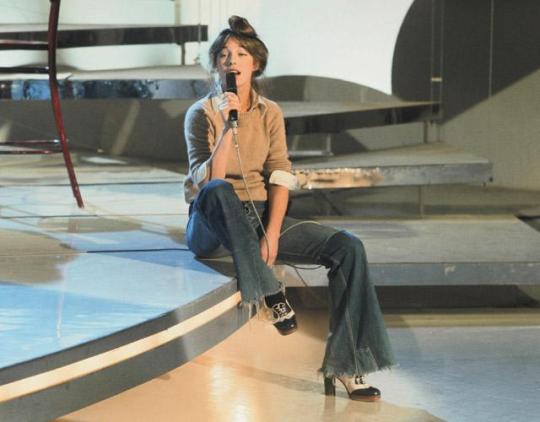
One cannot escape the nagging feeling when I listen to some of her albums - really the later ones - that if she had attempted a career as an English recording artist, she would have stayed a minor singer. If fished out of her small pond and dropped into the music ocean, then Birkin would surely in the words of one music critic, “be engulfed by the plankton of mediocrity”.
And so the troubling truth that must be faced is that because she has been granted access to the ranks of the iconic, it is more because of our interest in the intriguing liaison she had with the maverick Gainsbourg more than anything else.
There is no doubt that her marshmallow accent, reedy voice and modern look made Jane Birkin a singing idol. She has a sense of discretion that is inversely proportional to her dazzling repertoire, which is studded with such astounding masterpieces as ‘Je t’aime… moi non plus’, ‘Swimming Pool’, ‘The Pirate’ and ‘Les dessous chics’. But her later recordings such as Le Symphonique, in which she is accompanied by a 90-piece orchestra - are mostly re-worked recordings of her songs with Gainsbourg who had died in 1991. Or take her 1996 album Arabesque which featured re-workings of Gainsbourg’s music, along with instrumentals backed by five Arabic musicians. Nearly all her later albums are quite mediocre.
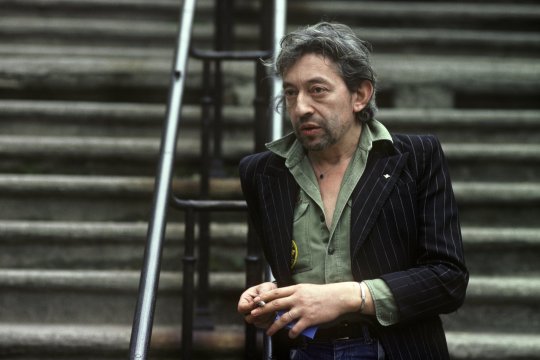
This isn’t her fault so much as it is the musical artistry of Gainsbourg. He was the puppeteer behind the promulgation of this 'veule aesthetic', this aesthetic of weak plaintive croaking. But he was perhaps the first French singer who knew that manipulating the media would lead to manipulating record sales. Gainsbourg once had a job punching holes into métro tickets on Paris' underground before this ‘poinçonneur de lilas’ went on to almost single-handedly drag France's chanson tradition into the postmodern age. He sat in the opposite corner to the great chanson Musketeers: Leo Ferré, Georges Brassens and Jacques Brel. Gainsbourg is known in France for having cast himself in twin roles: Gainsbourg the musician and Gainsbarre the provocateur.
But there is also a definite divide in his musical production with a pre-1971 period that has a foot in chanson with driving melodies and Boris Vian narratives and the other foot in the fledgling pop tradition, and a post-1971 period that was driven more and more by dodgy electronic drumbeats, tiresome perpetual punning, and repetitive allusions to la femme enfant and Lolita-esque love (his last partner, Bambou, was 30 years his junior).
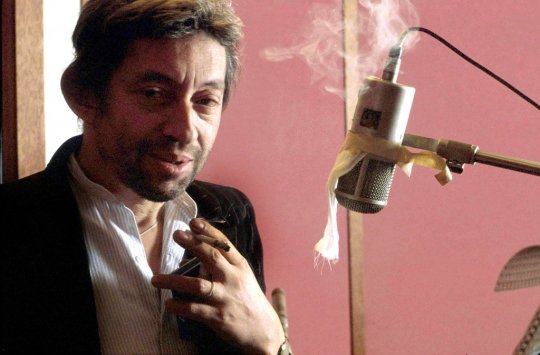
It remains difficult, therefore, to see how anyone with an ear for melody could think that much of Gainbourg's non-chanson output is melodiously pleasing. Much of his production seems so excruciatingly the work of an ageing pervert with personal hygiene issues.
My French friends, including one of my apartment neighbours in particular - of an older generation with whom I’ve grown close to - will put me through the wringer for saying anything bad about Gainsbourg and Birkin as singers. I just feel no one should be above a critical appraisal. Worse, it becomes very difficult to say anything critical for fear of being told that you just have not understood Gainsbourg's genius (surely Jarvis Cocker and Portishead can't be wrong!) But in reality there is very little to understand. He gave up trying to sing early on - the songs I really do like and find interesting - and quickly became the one-trick pony until his unfortunate death in May 1991 at 62 years old: a suggestive lyric about a questionable relationship here, a pun on every other word as an excuse for poetics there, slurred together with the voice of a sneering old man. The man stood out, broke away from troubadour-like folklore, but ultimately a tad mediocre.
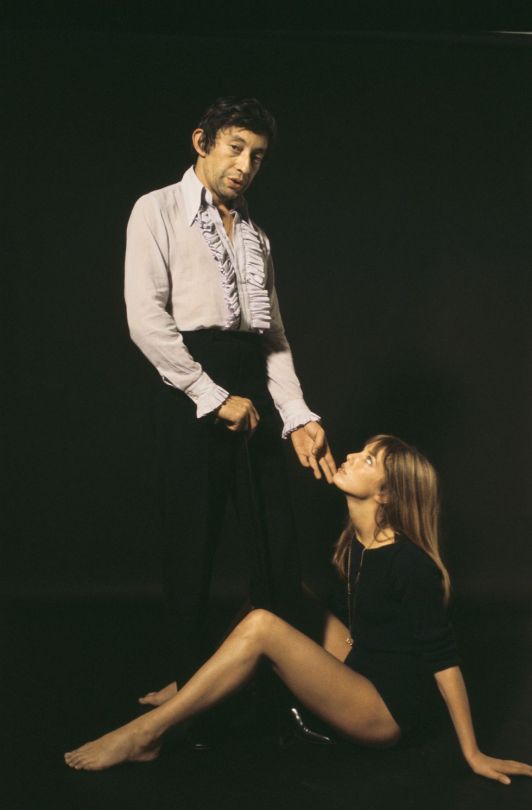
The truth is Birkin without Gainsbourg was never much of a truly great singer. Combined with their public spats, Birkin reportedly grew tired of Gainsbourg's drinking and melancholy habits, so much so it became impossible to live with. They separated in 1980 despite never being married, despite reports of the contrary. Birkin later said that their friendship and his songwriting improved after they split. “You could talk back to him for once,” she said. “You were not just his creation any more.” As much as she was his muse, she was Pygmalion to his Prof. Henry Higgins. But the sad and prosaic truth is that without his unique style of songs to carry her limited singing range she was dreadfully exposed outside of Gainsbourg’s repertoire.
This was brought home to me when I listened to her cover version of Cohen’s iconic song, ‘Hallelujah’. Cohen's lyrics tell of David composing a song in praise of God, he describes the euphony that 'hallelujah' forms in his prayer, "the fourth, the fifth, the minor fall, the major lift." Birkin on the other hand warbled her way through. As she said once of her singing, she went through more keys than a locksmith.
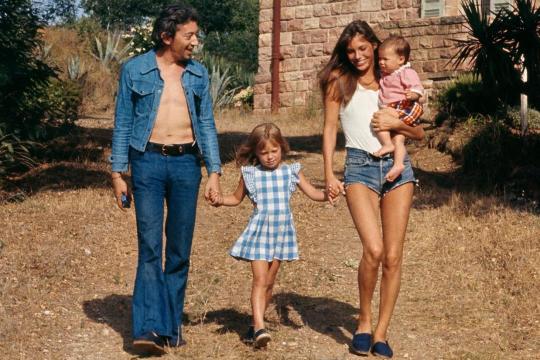
Does Jane Birkin fare better as a style icon? Yes, she does. Absolutely.
To understand the Birkin bag one has to understand how Jane Birkin a Parisienne fashion style icon without her necessarily wanting to be one.
The quintessential trope of Parisienne woman is a conflation we likely owe to the framing of the 1950s and ’60s mavens of French popular culture like Françoise Hardy, Catherine Deneuve, and Brigitte Bardot as French icons, but who remain eminently tied to Parisian mythology - their reverence to a billion-dollar fashion archetype (thank you LVMH) is as reductive to the real women of Paris as it is to the women aspiring to be them. Of course this kind of Parisienne chic exists - a walk down the rue du Faubourg Saint-Honoré in the 8th arrondissement of Paris should satisfy the many star struck ‘American Emily’s’ coming to Paris (what a God awful Netflix drama it is).
But like London or New York or even Rome and Milan, there is no such thing as one Parisian style. There’s a plurality of Parisian styles and personalities - that’s obvious from walking the different arrondissements of Paris.
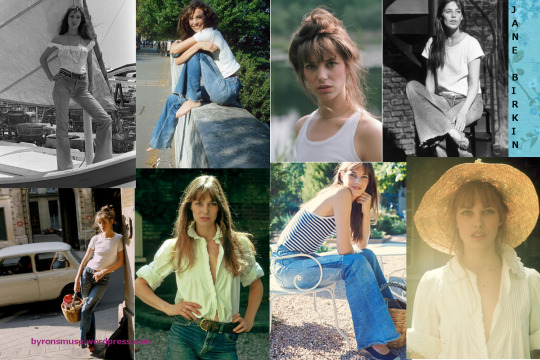
Jane Birkin in her day brought her own style to fit her British personality that was a far cry from the elegantly and expensively dressed mavens. From her laissez-faire fringe, to her layered necklaces, vintage denim, peasant blouses and white t-shirts, she wowed Parisienne women.
Today if you ever wander around Paris looking at the younger girls - or look at French young girls sporting their Paris street chic style on instagram or other social media - they call it Paris street chic. It’s not fashion, it’s a street style.
It’s really bunch of every day clothing items and accessories stylishly thrown together. So it’s not surprising to learn that the original source of French street chic started with Jane Birkin. It was Birkin who ‘pioneered’ the kind of off-duty dressing you now see all over the streets of Paris. I say pioneered but the truth is she dressed for herself without even wanting or trying to become a French style icon.
Still as fashionistas will tell you, Birkin was always several decades ahead of the style curve (easy for them to say). It was stylish but above all it was timeless. It amuses me no end that when one sees doe eyed American girls who are so enamoured by French girl fashion but don’t realise they owe their thanks to an English girl.

I’m sure it amuses Birkin too because she always thought her Haute-hippie style and free spirit was her way to insulate her personal insecurities about how well dressed and stylish haute bourgeois Parisian women were in their Chanel and YSL clothing. Her style is her own, as she said to Vogue, “I buy things often, but I sleep in them for two weeks, and then they really look quite rough.”
If there is common ground between the elegantly dressed mavens of high end brand fashion houses and the ultra casual minimalist street wear it is around the very simple Parisian quality of simplicity. Simplicity - not necessarily in colour or print but in the total look. Simple but important enough for a younger generation of Parisienne women should be free to express themselves free from the grips of a generations-old myth.
In a nutshell if Birkin’s style and influence endures it’s because her style is about simplicity.
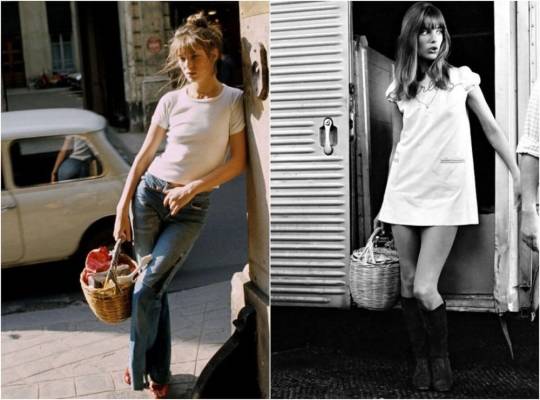
Nevertheless her place as a style icon rests upon a simple straw basket (or wicker basket). However, in 1981 a chance encounter on a plane would result in the straw basket’s replacement by the world’s most desired leather bag - the Hermès Birkin bag.
In the 70s she was mainly known for her use of a straw/wicker basket which she used instead of a regular handbag. She was famous for her straw basket as she went everywhere with it, even dancing at the most exclusive of clubs or eating at the finest dining places. She carried all kinds of bits and bobs, including baby milk bottles, diapers, and baby change wear as well as collecting trinkets on her journeys around Paris. It was seen as a stylish English eccentricity by the Parisians.
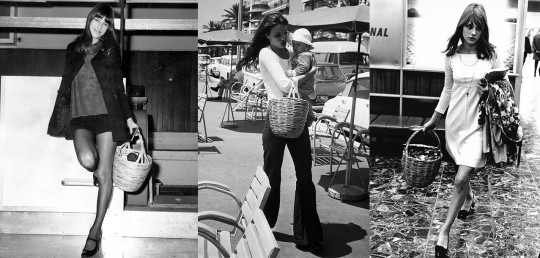
There is famous story about Jane Birkin and her straw basket that has entered into legend. The straw basket bag’s anonymous shape and generous size lent it to concealment, so when, during a lavish Christmas evening spent at the famous Parisian Bistro Maxim’s with Gainsbourg, the young English actress slipped a few pieces of the institution’s fine monogrammed crockery into it, nobody batted an eyelid. It was only later, when the basket slipped from her wrist while signing an autograph and sent her stash of china flying across the floor, that she was found out. In a perfect act of Parisian discretion a kindly waiter collected it up for her and replaced it in the basket. “A gift from Maxim’s,” he is reported to have whispered to her. “If you require more, you only have to ask.”
In 1981, Birkin was on a short flight from Paris to London. Carrying her famous straw basket, she placed it in the overhead compartment of her seat. However, the lid of the basket opened, and the contents spilled all over the floor and on the seats around her. Sitting next to her and assisting her in retrieving the contents of her basket was the late executive of Hermès, Jean-Louis Dumas. Birkin complained to Dumas that she was unable to find a suitable leather weekend bag that she liked. According to folklore, the remainder of the flight consisted of the pair designing a bag together and sketching ideas on an air sickness bag.
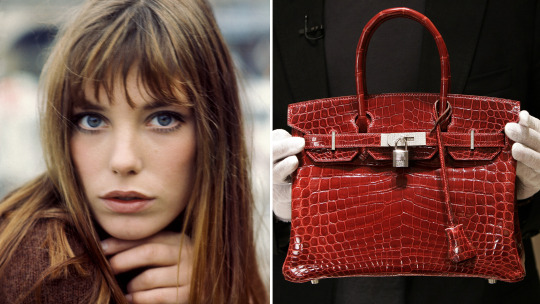
Fast forward three years and a prototype handbag was developed and presented to Jane Birkin – the Hermès Birkin bag. The bag, crafted from supple leather and handmade in France by a single, highly trained artisan, and takes up to 24 hours to complete. Designed specifically to provide ample room for jet-setting women, the bag quickly became a fashion icon and status symbol for women worldwide. The Birkin bag comes in a range of sizes, leathers, exotic skins, and hardware, with new colours introduced each season and limited edition versions of the bag crafted occasionally.
Since the creation of the very first Birkin bag, Jane Birkin had always carried one. However, true to her unique style and fashion, she continually customised her bags with beads, trinkets, protest stickers, and other titbits to create a unique look. Birkin even defaced her namesake’s bag on Japanese TV in 2008. The fashion icon repeatedly stamped on a tan-coloured Birkin bag to make it look “unique.”
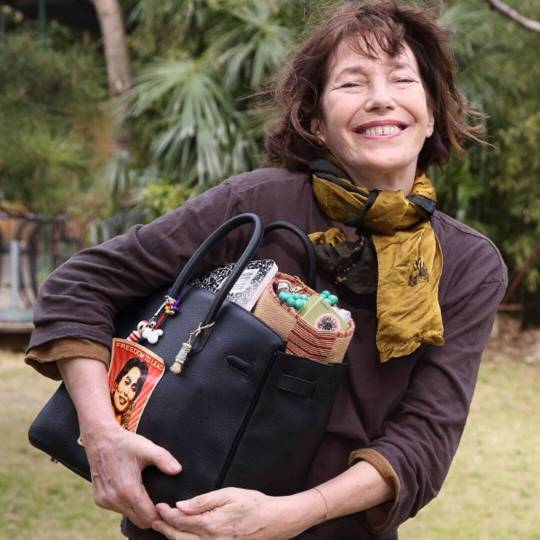
Not surprisingly, the customisation of the Birkin bag caught on quickly and “defacing” Birkin bags is now a modern and trendy pastime practiced by D list celebrities including Kim Kardashian, Tamara Ecclestone, and many of today’s so-called fashion icons and social media style influencers.
Commendably Birkin auctions off her complimentary Birkin bags from Hermès for charitable causes. She often works with Amnesty International on humanitarian issues and donates her yearly royalties for the Birkin bag (approximately $50,000 per year) to a charity of her choice. Jane Birkin has said she now rarely uses the famous handbag that bears her name. In an interview with the BBC she told the BBC that if, like her, she used to fill the bag with "junk... and half the furniture from your house, it's a very, very heavy bag. Now I fill my pockets like a man, because then you don't actually have to carry anything."
In typical Jane Birkin style, she doesn't own one.
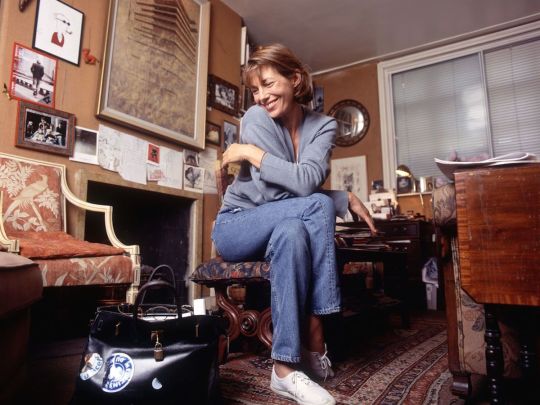
Jane Birkin will always be France’s favourite “petite Anglaise” as she was often known. And therein lies the clue why she remains beloved French icon despite her being English for two main reasons that come to mind.
Firstly, I suspect it’s because of her remarkable quality to be down to earth and cheerfully optimistic in public. Above all she displays a wonderful talent for mocking herself and not taking herself seriously. When for instance she was invited to take a role in a theatre production of a play by the 17th-century French writer Marivaux, she thought she was in a play by Marie Vau! The French have always been beguiled by her because of the stardust of the Sixties.
Despite Birkin being diagnosed with leukaemia in 2002, she said she conducted her life and love affairs with “an absolutely unfounded optimism”. That is not in doubt. With the recent publication of her diaries (Munkey Diaries 1957-1982 - a fantastic read) a more fuller picture has emerged that have further endeared her to the French.
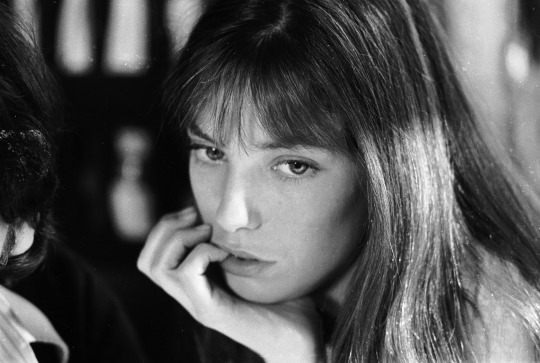
Birkin was always riddled with insecurities, “I think I’m nothing, I’m persecuted by women who I love more than myself... Oh for the face of Nastassja Kinski, of Fanny Ardant, oh, the talent, the courage, the qualities. I have nothing interesting to say...” Above all she was convinced she was “suffering from mediocrity and no personality”, and wanted above all was to be loved. England never gave her that love, France did so happily. Even today France openly loves her.
Secondly, the French, especially the Parisians, love her because she embraces the French way of life with gusto and gaeity. Birkin speaks French fine but she stumbles in her heavily accented French. But she doesn’t mind and neither do the French. She was schooled in England into a culture where it’s okay to stumble, to try and fail, to be less than perfect. However, the old, rote, didactic, shame-based French schooling system dies hard. French people are often afraid to speak English unless they can feel assured it is impeccable at the same time - alomost in contradiction - they feel put out by foreigners who simply speak English to them without even having the courtesy to speak a little French, they think it rude and respond accordingly. But Birkin is so transparent and open to falling flat on her face that I think the Parisians find it strangely endearing.
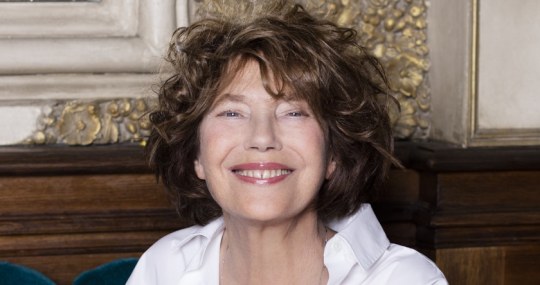
Birkin is that living truism that you don’t have to be French to be a Parisian icon of style and especially when beauty pertains to age.
Outside of native born French women, Brigitte Bardot, Françoise Hardy, Catherine Deneueve, Jeanne Moreau, Fanny Ardant, Juliette Binoche, Inés de la Fressange and one or two others (Isabelle Huppert is an outlier of arthouse chic style), there have been other non-French women besides Jane Birkin who have personified Parisian chic and style: Sylvia Vartan, Charlotte Rampling, Nastassja Kinski, Kristin Scott Thomas, and Carla Bruni, to name but a few. Each has come to embody ‘Parisian style’ without ever being raised here but now very much live and breathe the Parisienne spirit.
Just as importantly Paris, like French culture as a whole, values beauty especially as it ages. There are many seasons to women as there are to make fine wine. This is one reason why Jane Birkin endures even at the age of 73 years old. Style icons like Jane Birkin and others like Inés de la Fressange (who was the face of Chanel for so long and is now going strong at 63 years old) have given a well deserved middle finger to the notion that there is a codified set of rules for fashion and beauty for women over 50 years old.
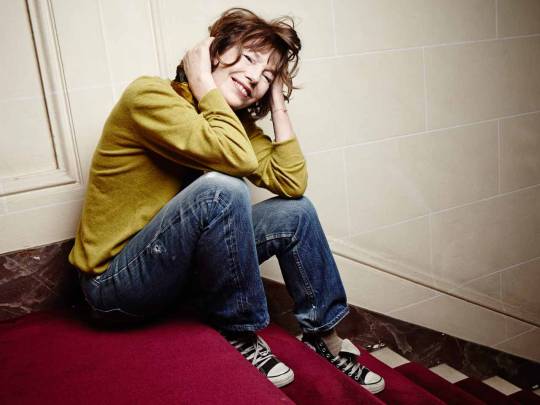
Indeed this is one of the secrets of living in Paris, it knows how to renew and refresh itself without losing its unique identity e.g. the model and actress Jeanne Damas, is arguably this current generation’s Jane Birkin and all power to her.
The stylish contributions of all these iconic women, and especially Jane Birkin, is a testament of why the allure of Paris as a cultural centre will continue to endure seamlessly because it values the aesthetic truth that true style is beauty that timelessly matures.
Birkin said once she was in no doubt she would always be best known for her erotic record Je t'aime, moi non plus. Of course she under sells herself as she has always done because she is so much more.
Compare her to modern style icons. Kim Kardashian would be the nearest but her fame as a style icon rests on one cynically contrived (and boring) sex tape, a narcissistic family TV reality show, and being married to a grossly deluded rap singer. I don’t think the modern day airheads are true style icons but fashion victims because as Yves Saint Laurent once memorably put it, “Fashions fade, style endures”.
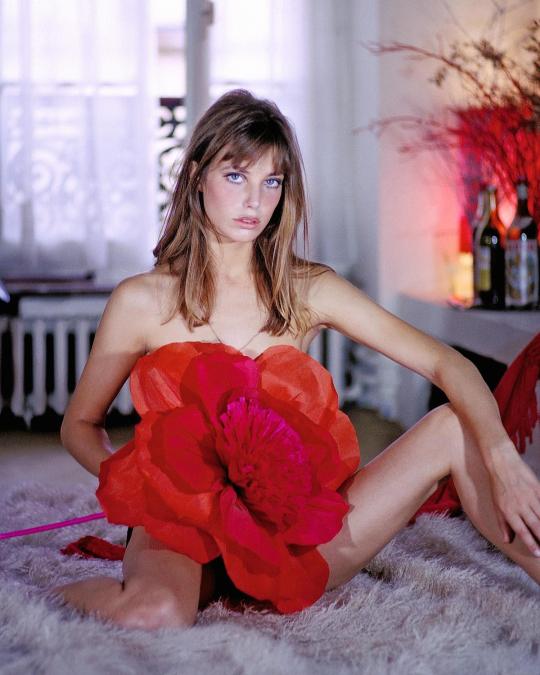
Jane Birkin will endure. Her contribution to French cultural life has been immense. The gap-tooth smile that looks irrepressibly cool, the messy fringe, the long string bean legs, the ability to elegantly wear denim for any and every situation, the reason she made a lowly wicker basket her bag of choice all year long. We may never know why, but honestly it’s not worth questioning at this point because it was so seriously chic - is one even allowed to say the word chic again? When it comes to Birkin, it’s a word that bears repeating.
Birkin might cheerfully be accepting of the fact that for an older generation much of her fame still rests on one scandalous song but for the contemporary generation it will be the Hermès Birkin bag.
"It's a rather extraordinary record," Birkin said once. "Perhaps more interesting than the bag." I daresay Serg Gainsbourg would agree about the song and the bag.
Ah yes that bag. The Birkin bag. To me it’s not a fashion item but a life saver.

From mothers juggling diapers and milk bottles whilst chasing after their toddlers in stores to busy career women hurriedly scooping up and stuffing in reams of files, phone and lap top while rushing off their feet to their next meeting all can thank ‘la petite Anglaise’ for her Birkin bag.
I know I do. I use mine for a work lap top, mobile phone, work files and folders, pens, chewing gum, girls stuff (make up kit and tampons), a spare pair of knickers, sun glasses, gloves, an apple, a bottle of water, playing cards, a cigar case (and cutter and lighter), and a few books to read when I fly on a business trip.
Thanks for your question.
#question#ask#jane birkin#serg gainsbourg#icon#birkin bag#paris#parisienne#style#music#fashion#paris street chic#culture#society#england#1960s#personal#france#film#femme#beauty
184 notes
·
View notes
Note
I really don't get the complaint about Ironwood. His descent into a villain honestly made perfect sense.
Okay, look. Before I begin, let’s just get one thing straight. The way I view Ironwood is mainly my opinion, and it is not an objective fact. Love or hate him, I hope we can all have an intelligent and rational discussion on the way General Ironwood was portrayed, okay? Okay.
My problem isn’t necessarily how Ironwood became a villain in Volume 7, but rather, how he acted as villain in Volume 8, and what the story was trying to say about him and his actions. Buckle up first, there’s some infodumping to be done before we get there.
Now, for those who haven’t seen RWBY (and be warned, spoilers are obviously ahead), General James Ironwood was a supporting character introduced during the show’s second “Volume”. He was in charge of all the military forces of Atlas, the most militaristic of the four main kingdoms in the world of the show.
He had a bit of a bad reputation in universe for bringing a lot of his troops to Beacon Academy (where the first three Volumes took place) for a fighting torunament to serve as security. Long story short, thanks to an act of sabotage from the villains, an army of monsters called Grimm and a faction of former equal rights movement turned terrorist organization known as the White Fang attacked Beacon, killing a lot of people and forcing the survivors to retreat.
Ironwood had a handful of scenes in the next Volume, showing his support for one of the main characters, Weiss, and donating a robotic arm to another main character who had lost hers in the Fall of Beacon, Yang. After, that, he was mostly silent until Volume 7, where our heroes made their way to Atlas to deliver one of the four MacGuffins the main villain Salem needs to Ironwood.
We see that since the Fall of Beacon, Ironwood has been stretched thin in protecting Atlas over the run down town directly below it, Mantle. It’s clear that Ironwood can’t really keep up with handling both towns, to the point where not only is Mantle protected by a single robotic supersoldier named Penny, but Ironwood is also diverting supplies meant to fix a wall to keep Grimm out of Mantle in favor of working on converting the same stadium used for the tournament in Volume 3 into a satellite to restore global communication, which had been down since the Fall of Beacon.
The heroes are naturally conflicted about their loyalties to Ironwood, as while he has given them his trust, they don’t really trust him to tell him some of the secrets they learned. Blake and Yang, two of the heroes who have always been more opposed to authority, leak classified information regarding the satellite to the leader of a group of freedom fighters, Robyn Hill (who is actually voiced by Christina Vee), who at this point, was someone Ironwood viewed as a threat.
Now you could make the argument that these college drop-outs are severely unqualified to handle a tense situation that even a seasoned veteran like Ironwood is struggling with, but the point is when Ironwood finds out, he’s pissed. It’s really not hard to agree with him when you consider everything he’s done for Team RWBY and their friends only to be betrayed like this. So Ironwood declares all of the heroes fugitives and place a warrant for their arrest
At this point in the story, you can understand both sides of the argument regarding how to handle the situation. Ironwood’s anger is very understandable, and while he acts as an antagonist to out heroes, he’s not really a villain.
And that’s when he shoots a fourteen year old child. Granted, he currently had the soul of an old friend of Ironwood in him, but Ironwood literally just tried to murder someone, and almost succeeded.
Volume 7 was very polarizing among RWBY fans for the portrayal of Ironwood. It doesn’t help that when Salem, the main villain of the series, launched an invasion of Atlas, Ironwood’s plan was to launch Atlas and keep Salem from getting the MacGuffin, essentially distancing it from the rest of the world... when Volume 7′s final episode aired in February 2020.
Now, you would think, after being forced to stay in their homes to minimize Covid deaths, the writers would understand what they were antagonizing Ironwood for was basically what every government in the world did a month after they finished work for the Volume, and maybe realize that maybe they shouldn’t portray someone like Ironwood as a complete monster.
Volume 8 opens with him killing a councilman who disagrees with him. And it all goes downhill from there.
This Volume goes out of its way to portray Ironwood as a genuine psychopath, mainly to stop the people who agreed with him over Team RWBY from supporting him. He does things like working with one of the villains to achieve his goal, gives his soldiers permission to torture people for information, and after Salem is neutralized temporarily, rather than continue to evacuate Mantle like he had originally planned before the villains and Team RWBY screwed up his plans, he decides threatening to bomb Mantle to use as leverage is a better idea.
And then there’s the whole idea the the writers want to treat Ironwood losing his arm in a fight and replacing it with a robotic one like Yang as a symbol of him “losing his humanity”. It’s... kind of insulting when you realize that Ironwood is a man suffering from PTSD, and the show is basically demonizing anyone who uses prosthetics in their daily lives, or is traumatized from war.
I’m not saying Ironwood is just like Chloe, but the way both narratives choose to demonize both characters to spite their fans is why I draw the similarities in the first place.
There’s also the fact that the writers claim Ironwood is acting this way because of his Semblance (they’re basically Quirks from My Hero Academia) giving him an iron will that won’t make him change his mind on his decisions... when it’s never addressed in the show, is only mentioned at a fan panel, and not even Ironwood’s voice actor knew about this until a fan told him. It’s a stupid way to handwave away the criticisms that Ironwood is acting out of character, and is universally considered by fans to be the dumbest Semblance in the show.
But overall, the point I am trying to make is that instead of portraying him as this morally grey villain who merely opposes the heroes because he has a different way of solving problems, the writers decide that isn’t a good thing, so they demonize him just to make Team RWBY and the heroes (who many have claimed do a lot of bad things this Volume) look better by comparison.
I’m sorry if you disagree with me, but I just want to understand that I am not trying to attack anyone who hates Ironwood. Like Adrien, I don’t hate the character entirely, I just don’t like the way he is handled, and simply prefer his fanon self over what we got in canon.
#immaturity of thomas astruc#not miraculous ladybug#rwby#rwde#james ironwood#weiss schnee#blake belladonna#yang xiao long#salem#robyn hill#adrien agreste#chloe bourgeois
28 notes
·
View notes
Text
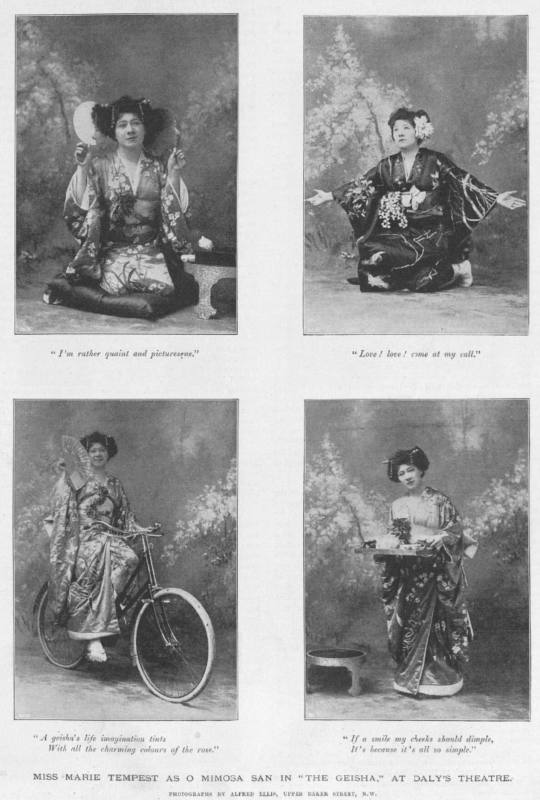
Tempest, Marie (1864–1942) English actress who was hugely popular in both musical comedy and comic plays. Born Mary Susan Etherington on July 15, 1864, in London, England; died on October 14, 1942; educated at Midhurst and at a convent in Belgium; studied singing at the Royal Academy of Music, London; married Alfred E. Izard (divorced); married Cosmo Gordon-Lennox (an actor and playwright), in 1898 (died 1921); married William Graham Browne (an actor-director), in 1921 (died 1937); no children. Made London debut as Fiametta in Boccaccio (Comedy Theater, May 1885); appeared as Lady Blanche in The Fay o' Fire (Opéra Comique, 1885), in the title role in Erminie (Comedy Theater, 1885); took over the title role in Dorothy (Prince of Wales Theater, 1887); appeared as Kitty in The Red Hussar (Lyric Theater, 1889); made New York debut in the same role (Palmer's Theater, August 1889); toured U.S. and Canada with the J.C. Duff Opera Co. (1890–91); appeared as Adam in The Tyrolean (CasinoTheater, New York, 1891), O Mimosa San in The Geisha (Daly's Theater, London, 1896), in the title role in San Toy (Daly's Theater, 1899), as Nell Gwynn in English Nell (Prince of Wales Theater, 1900), in the title role in Peg Woffington (Prince of Wales Theater, 1901), as Becky Sharp in Vanity Fair (Prince of Wales Theater, 1901), as Kitty Silverton in The Marriage of Kitty (London and New York, 1903); toured America, Australia, and elsewhere (1914–22); appeared as Annabelle Leigh in Good Gracious, Annabelle (Duke of York's Theater, 1923), as Judith Bliss in Hay Fever (1925), as Angela Fane in The Cat's Cradle (Criterion Theater, 1926), in the title role in The First Mrs. Fraser (Haymarket Theater, 1929), as Fanny Cavendish in Theater Royal (Lyric Theater, 1934), as Georgia Leigh in Short Story (Queen's Theater, 1935), as Dora Randolph in Dear Octopus (Queen's Theater, 1938).The celebrated English actress Marie Tempest first graced the stage as a singer in operas and musical comedies before taking up serious acting, at which she was also immensely successful, at age 36. Tempest's phenomenal popularity lay not so much in her creative genius, but in her unique ability to bring much of her own personality and temperament to the characters she portrayed. "She seems to radiate the joy of living," wrote a reviewer for the London Times upon seeing her performance in The Cat's Cradle in April 1926, "to drive it home to us by her mere presence, by the inspiring notes of her voice, and by the depth of worldly experience and indulgence for our human foibles in her glance. Briefly she is a perpetual refreshment and source of pleasure; something for which the theater exists and by which it triumphantly justifies its existence."
Born in London in 1864, Tempest was educated at Midhurst and at a convent in Belgium until age 16, when she took up the study of music, first in Paris and then at London's Royal Academy of Music. While still a student, she made her singing debut at St. James's Hall, and from that time on was hooked on performing. Taking her stage name from her godmother, Lady Susan Vane-Tempest , she began her career singing in the provinces, and made her London debut in May 1885, in the role of Fiametta in the comic opera Boccaccio. Critics unanimously praised her voice but were somewhat divided on the subject of her acting.
In February 1887, after leading roles in The Fay o' Fire, Erminie, and La Béarnaise, Tempest took over the title role in Dorothy from Marion Hood . She played the role for two years, then won great acclaim as Kitty Carroll in The Red Hussar. Tempest made her American debut in that same role, opening at New York's Palmer Theater on August 5, 1889, to the delight of the critics. "It was a success and from the last notes of the song, Marie Tempest was received into the affections of New York theatergoers," wrote one. "After that the opera seemed to be a secondary consideration and the other players were but foils. Tempest only could fill the stage." The actress then toured the United States and Canada with the J.C. Duff Opera Company, taking roles in several well-known operas, including Arline in The Bohemian Girl, the title role in Mignon, and Mabel in The Pirates of Penzance. In October 1891, she returned to New York, where she was in constant demand for the next three years.
Back in London in 1895, Tempest began a five-year engagement at Daly's Theater, then under the management of George Edwardes. Now considered the queen of musical comedy, she was treated like royalty by Edwardes who insisted that she use the royal entrance rather than the stage door, and saw to it that a carriage waited
for her each evening after the show. Tempest also became the first actress to have her clothes designed by couturiers rather than theatrical designers. In 1898, she met and married actor and playwright Cosmo Gordon-Lennox, who also treated her like royalty, indulging her passion for shopping and redecorating. He introduced her to the world of literature and other intellectual pursuits. (Gordon-Lennox was Tempest's second husband; during her Royal Academy days, she had married and divorced Alfred Izard.)
In 1899, Tempest had a falling out with Edwardes over some long trousers he wanted her to wear for the title role in San Toy. She considered them tasteless and cut them into shorts before her first entrance, infuriating Edwardes and destroying their professional relationship. Not only did Tempest walk away from Daly's over the incident, but she turned her back on musical comedy as well. In August 1900, she entered the second phase of her career, opening as Nell Gwynn in English Nell, a play directed by Dion Boucicault, who also helped Tempest make the transition to straight plays. (She was serious about learning her craft, frequently spending an entire morning rehearsing simple stage business, like answering a phone or pouring a cup of tea.) Boucicault also directed Tempest in the title role in Peg Woffington , and as Becky Sharp in an adaptation of Vanity Fair (both 1901). In 1902, also under Boucicault's direction, she played Kitty Silverton in The Marriage of Kitty, which her husband had adapted from the French. The play, a huge success, marked the beginning of Tempest's eight-year relationship with producer Charles Frohman and remained in her repertoire for the next 30 years.
While Tempest was perfecting her acting technique and gaining a new reputation as a talented comedian, her marriage to Gordon-Lennox collapsed. In 1908, she met William Graham Browne, an aristocrat and actor six years her junior; their relationship is described by Eric Johns as the first deep friendship of her life. Their professional and personal association lasted 29 years, until Browne's death in 1937, although they did not marry until after Gordon-Lennox's death in 1921. Browne directed many of Tempest's productions, and encouraged her to further improve her acting. He also served as troubleshooter. "She was far from easy to work with," writes Johns, "and part of Willie's mission in life was to pour oil over troubled waters and keep the troupe together and in a reasonably happy frame of mind."
In September 1913, Tempest began a stint as manager of the Playhouse Theater in London, where she opened in the title role in Mary Goes First. With the outbreak of war in Europe, however, she soon went into debt. To keep afloat, she and Browne set off on a world tour which began in Toronto in October 1914, and over the course of the next eight years took them to New York, Chicago, Australia, New Zealand, South Africa, India, the Straits Settlements, China, Japan, the Philippines, and through the United States. Tempest returned to London's Duke of York's Theater in 1923, playing the role of Annabelle Leigh in Good Gracious, Annabelle, which had been warmly received on tour. The London audience, however, hated the play and hissed and booed their disapproval. "How long I stood there, leaning against the wings I do not know," she told her biographer Hector Bolitho. "Dimly I remember clapping my hands over my ears, trying to shut out that cruel noise. Able to bear it no longer, I rushed to my dressing room and closed the door behind me … after thirty-seven years as a trouper I had been booed for the first time and in London." Tempest also said that something in her died that night and that afterwards she never felt quite the same about her "dear public." To improve her frame of mind, she revived The Marriage of Kitty, and ran nearly a year in it.
It was not until her role as Judith Bliss in Noel Coward's Hay Fever (1925), a role written with her in mind, that Tempest had her next unqualified hit. "The most delightful thing of the evening was to see Miss Marie Tempest coming into her own again with a part which gave every scope for her really distinguished sense of comedy and her admirable technique," wrote the critic for Punch. She "moved the house to a storm of spontaneous applause by the exquisite singing of a little chanson d'amour, and it was in perfect voice—not a note strained or even thin." Hay Fever ran for 337 performances and was followed by The Cat's Cradle (1926), another solid hit for the actress.
Tempest continued to perform throughout the 1930s, celebrating her jubilee on May 28, 1935, with a special benefit performance at the Drury Lane Theater. She was made a Dame Commander of the British Empire (DBE) in 1937, which was also the year she lost Willie, a shattering blow from which she never fully recovered. Her last appearance on the London stage was as Dora Randolph in Dodie Smith 's Dear Octopus, a successful venture that ran for 373 performances. Glen Byam Shaw, who directed the 67-year-old actress in the play, was awed by her genius for stage business, particularly in a scene in which she was listening to her daughter's problems while setting the table for dinner. "As she listened she made table napkins into the shape of water lilies, but fitted each deft movement to the text, thus pointing the daughter's lines in the most apposite manner. It won a round of applause every night."
Tempest was rehearsing for another role, under the direction of Henry Kendall, when it became clear that she was unable to learn her lines and had to be let go. She took the news bravely, although her eyes were filled with tears as she awaited the taxi to take her home. She died within six weeks, on October 14, 1942. Noel Coward had once paid fitting tribute to Tempest: "When she steps on to a stage a certain magic occurs, and this magic is in itself unexplainable and belongs only to the very great."
#Marie Tempest#soprano#Royal Academy of Music#Erminie#Hervé#Alfred Cellier#Dorothy#Doris#The Red Hussar#Edward Solomon#Georges Bizet#Manon#Carmen#Jules Massenet#Mignon#Ambroise Thomas#The Bohemian Girl#The Pirates of Penzance#Arthur Sullivan#The Geisha#Sidney Jones#Charles-Francois Gounod#Faust#Leo Delibes#Les Filles De Cadix
12 notes
·
View notes
Text
Examine the ways in which films deal with social, political, cultural, and economic issues, both in direct and indirect ways. What is the political impact of cinema on audiences around the world and how do we see it? Should filmmakers directly engage with these kinds of issues or do so subtly? Discuss any of the films we have watched so far from this perspective, and draw upon other examples if necessary.
Social commentary exists in many forms. We read it in books and hear it in music of every genre. It does not discriminate, covering every issue from politics to economics. As film grew into its own medium, it became a new platform for artists to utilize in portraying their visions of the world. Whether they be whimsical and over the top, or down to earth and stunningly realistic, movies grew to become one of the largest entertainment industries. Directors and screenwriters, whether inspired by or displeased with their surroundings, came to use film as a method of sharing their thoughts and emotions. Be it through direct or indirect means, they would criticize politicians and governments to historic and current world events. Certain countries were more limited than others in controlling the content of films, pushing creators to become even more crafty and thoughtful when conveying their opinions on screen.
With the Motion Picture Production Code in full effect in the US, film makers who wanted to touch upon political issues in American society had to do so in a very subtle way. Take Force of Evil, for instance. On the outside, it reads like a classic gangster movie that was commonly seen in the 1940’s. However, it is deeply critical of the money and power-hungry American underbelly of society, digging into the Capitalism that has overtaken the country even in these earlier years. Irony is found in the two main characters, a pair of brothers. Joe is a lawyer who runs dirty deals with gang members, using his education and career to further their unsavory deeds. His brother Leo believes that his own line of work is earnest and respectable, when in reality it is not. Leo runs a ‘bank’ for the small number rackets that exist in New York City, mainly centered around bets that are placed on horse races. Leo strongly feels that he is not as morally corrupted as his brother, despite being in charge of an illegal business.
The mise-an-scene of the film is what really drives home the underlying critique of money and its corrupting force. Joe takes Leo’s former secretary Doris for a walk on Wall Street, taking her through a church cemetery. The church building is completely dwarfed by the towering buildings of Wall Street’s capitalist businesses. The implied message here is that money is the new God, that the hold it has over people is nearly as strong as religion.
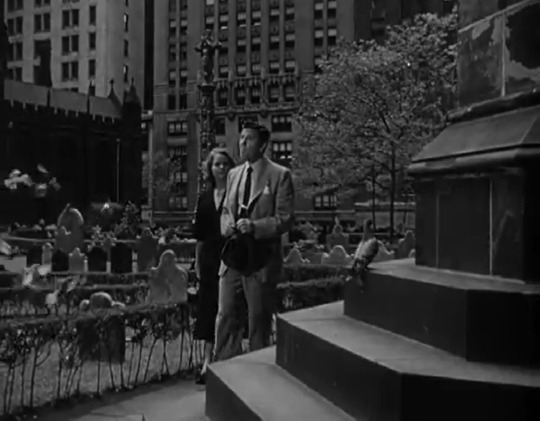
For Polonsky, who was put on the blacklist by HUACC for his leftist ideals, this message is as true to him as it gets. In Polonsky’s eyes, people no longer feared God as much as they did losing money in capitalist America. Considering what the entire world had just lost three years prior in World War Two, it is almost insulting to showcase people like Joe and his associates on screen. Money grubbing is not what America wanted its people to think they had fought and died for, just the opposite. Justice and morality is what America wants people to think it stands for, not capitalism and the desire to supersede the people in their lives. Force of Evil is astoundingly subtle and simultaneously gritty, holding true to the film noir standard of the times.
At the end of the film, when Leo is killed by Joe’s nefarious associates, Joe goes to retrieve his brother’s body. Stairwells are used as a metaphor for an internal moral struggle. In a voiceover, Joe laments ‘I just kept going down and down. It felt like I was going to the bottom of the world.’ The decrepit area beneath the bridge is the exact opposite of the organized, shining city above. Finding his brother’s body is Joe’s moral rock bottom, both literally and metaphorically. It is a slap in the face for Joe, stripping away all of the justifications he has held for his less than moral behavior and actions.
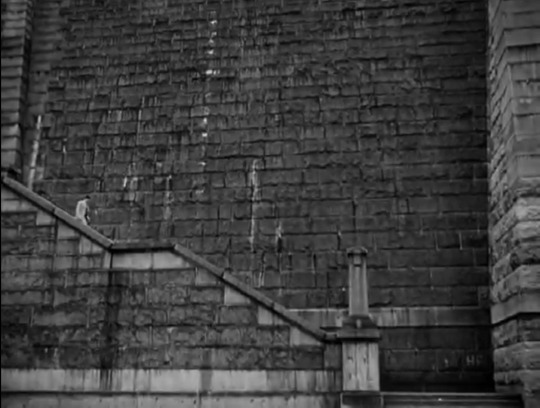
Polonsky cuts to Doris as Joe says, ‘He is dead,’ juxtaposing the image of a living woman with the realization that his brother Leo is gone. It is jarring, but it also suggests a dual motivation rising within Joe. Inspired by Doris’ love and Leo’s death, Joe turns to make his way back up the enormous staircase. This finale leaves the viewers with some hope that Joe can possibly redeem himself after his selfish actions, but will it be as quickly as he ran down the stairs towards his brother’s corpse?
One wouldn’t think that in 1950’s America, a bold film would tackle such a hot social issue: equal rights for African Americans. Especially with the Motion Picture Production Code still in full effect. Typically, when reflecting on movies from that decade, our minds are filled with images of romantic melodramas, as well as musicals and other bright, cheery content. The Defiant Ones not only tackled the issue of racism in America, but it also set the standard for the ‘buddy’ films that are commonplace today. Two escaped convicts are chained together at the wrist, one white and one African American. The film goes back and forth between Johnny and Cullen’s escapades whilst on the run, and the officers who have been assigned to track them down and take them back to prison. The tone of the film is established in the first few minutes, when one of the officers refers to Cullen as the n-word. Later on in the movie, when Johnny and Cullen are apprehended by a group of townspeople after attempting to rob their general store, they start stringing up two nooses. Johnny is mortified, looking around at the townsfolk with terror in his eyes. ‘You can’t lynch me, I’m a white man!’ he pleads. The message is clear: lynching is something white people do to black people.
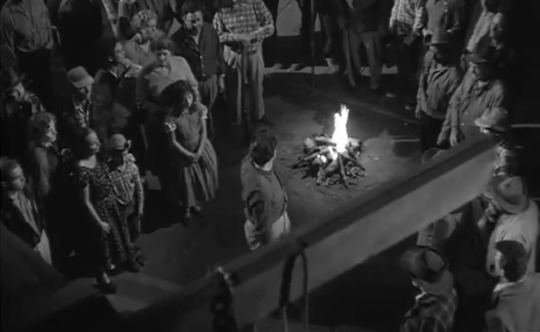
Not only does the movie look at the harsh reality of life for African Americans at the time, but the relationship that develops between Johnny and Cullen is in itself socially and politically charged. Over the course of the movie, the two convicts go from being at odds with one another to developing a close friendship. Not even Johnny’s mistake to trust the woman they holed up with can break their bond. Johnny leaves the woman behind to rescue Cullen from the dangerous swamps. At the film’s end, Cullen is cradling Johnny, who is wounded from a gunshot to the chest. They are collapsed on the grass together, sharing a cigarette while Cullen sings and the police detective approaches to apprehend them.
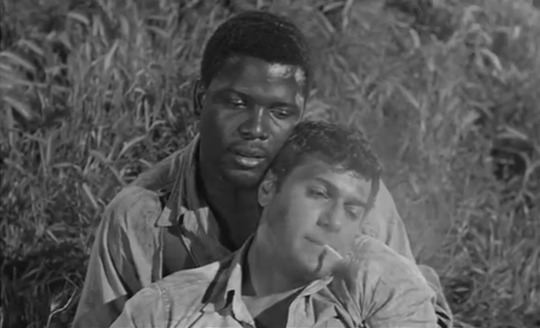
Not only has Johnny moved past his racist ideals, but one could also say that their positioning at the end of the film is borderline sexual. The way Cullen holds Johnny is almost as if it is in a lover’s embrace. Cullen’s portrayal in the film is especially bold, since he was portrayed to be well-spoken, intelligent and overall good. A far cry from films like Birth of a Nation where African Americans are put in the most negative light possible, portrayed as thieves and rapists while the Ku Klux Klan members are seen as heroic and noble. The Defiant Ones, supported by Sidney Poitier’s phenomenal acting, gave rise to a much more positive role for African American actors to portray on screen. Though the ‘righteous Black man’ did end up becoming a trope in Hollywood for many years, it was still a positive step in the right direction for civil rights.
Outside of the US, films were not constricted by strict standards of morality and content. They were much freer to openly criticize the societal norms and political atmospheres that were in place at the time of their creation. Hiroshima Mon Amour is a French made film that touches on the devastation of the nuclear bomb drops in Hiroshima and Nagasaki. While the movie itself seems to be mainly centered around a couple who cannot be together due to extenuating circumstances and their own inner demons, it is also direct commentary on how Japan remembered the bombings, and how different it is from the perspective of the rest of the world.
The first ten minutes of the film are composed of an almost poetry-like sequence of shots of Hiroshima before and after the bombs paired together with the two main character’s voice overs. The characters, a French woman, and a Japanese man, are in bed together in a loving embrace. The opening shot features ash falling onto their naked bodies, which we can infer mimics the death ash that fell onto Hiroshima after the atomic bomb’s detonation. This frame cross fades into nearly the same image of the naked couple, but the ash is gone from their bedroom.
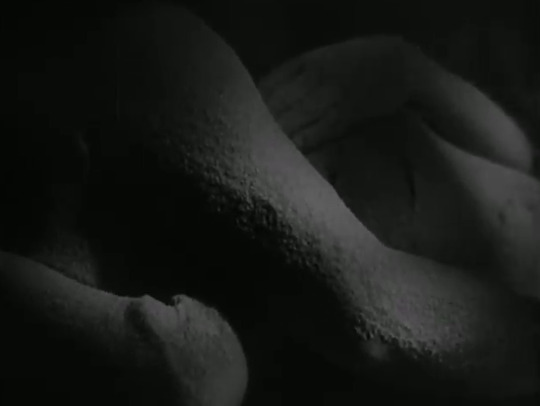
The woman is stating that she knows all about what happened in Hiroshima, from having seen the newsreels that aired after the bombs had been dropped. The man argues that she has no idea what really happened. She states that in the newsreels she viewed, bugs were already crawling up through the debris and dirt on the second day and that flowers were growing all over Hiroshima just a few days after the bomb had been dropped. This voiceover is paired with the footage of a young boy being treated for burns and lesions on his skin, the exact opposite of new life springing forth from the ashes. The obvious pain that the boy is enduring is starkly contrasted to how the French woman describes all the different kinds of flowers that began blooming after the bombs had been dropped.

The Hiroshima that exists in the French woman’s mind is completely different from the Japanese man’s. This speaks to the overall theme of the movie, that collective and individual memories, as well as one’s identity can be corrupted. That the human brain is not a perfect organ and at times, it can even be our worst enemy. The French woman protests that she has seen Hiroshima. She had been to its museums, she knew how it had been over ten-thousand degrees in Peace Square at the time of detonation, and she had seen the films that had been made about the devastation. Her partner states over and over during this intro sequence that, ‘You saw nothing in Hiroshima. Nothing.’ Her experience of the disaster when compared to his is hollow, a clever way of illustrating how two people can think of the same event so differently.
Even if the trend of filmmaking has changed, shifting from film noir and melodrama to the blockbuster and action movies, social commentary still persists throughout the media. As the world around us changes and moves forward (be it for better or worse), so does the real-life content that directors and screenwriters are inspired by. Seeing politically and socially charged movies, whether they are extremely subtle or right up in your face, helps us both cope with world events and immortalize what occurred. As if to say, ‘We were here. We saw what took place. This is how we remember it.’
14 notes
·
View notes